#war in the pocket ova
Explore tagged Tumblr posts
Text

Reblog this zeon mobile suit with a pump shotgun if you think its cool as fuck or if war is hell and all war media regardless of intent only serves to glorify death and destruction
#reblog#zeon mobile suit#pump shotgun#mobile suit gundam#mobile suits#war in the pocket#war in the pocket ova#anime#gundam
6 notes
·
View notes
Text

hes so adorable
5 notes
·
View notes
Text


I just saw War In The Pocket for the first time in a packed movie theater and it was like the mecha movie I've always wanted to watch but never knew existed.
4 notes
·
View notes
Text

HGUC 1/144 E.F.S.F Mass-Production Locality Specialization Type Mobile Suit RGM-79D "GM Cold Districts Type"
More GMs!!! I had a lot of fun with the old 2001 GM, the new 2023 'The Origin' GM Missile Pod, and the GM Sniper II, so of course I had to continue the collection.
The GM Cold Districts Type is a suit that briefly appears in the opening scene of the OVA "0080: War in the Pocket". It's a pretty basic redesign of the classic GM, with the large star removed from the shield, and extra vents added to the face (resembling the GM Sniper II from the same series) and shoulders, and an antenna added to the back of the head.
This kit in particular is from 2003 and reuses a lot of the moulds from the 2001 GM kit. However, this kit seems to have a lot of drawbacks as well. While the shoulders have been competent redesigned in a manner that resembles more contemporary kits (and makes them much more secure), the actual shoulder joint is a peg directly moulded into the torso rather than being a ball joint or hinged peg like most other kits. This gives the shoulders very limited range of movement.
The kit also has the disappointing old solid plastic beam saber, with the hand itself moulded into the saber hilt as well! This is a really bizzare choice even for 2003, so I discarded the beam sabers that came with the kit and re-used a spare from my Origin RX-78-2 alongside a beam effect, which looks a lot better.


I spent a lot of time detailing this kit. I used the old waterslide decal sheet for the 2001 GM rather than the limited foil stickers that came with the kit. I also tried a weathering method @radiofreemagica told me about where i sponged on black onto the sharp angles and high points, then drybrushed over the top with gunmetal. I also sponged on Vallejo pale brown and light rust in key areas to accentuate the weathered effect.
This was my second time using the Tamiya weathering set D on gunpla as well. I used the orange and blue on the gun to give a heat blueing effect, and the "oil stain" pigment worked great over rust areas to even out the light grey plastic.


I think the overall effect worked especially nicely on the darker torso and shield. I also had to paint the face vents, rear camera, back of the shield, and shoulder vents, as well as the yellow waist V logo and the grey border on the bottom two chest vents, so be aware if you're not a fan of colour correcting kits. Also, as always for UC kits, I did the inside of the booster jets in red.
This kit comes with limited hand options, with a single left open hand, left open fist, and right pistol grip, which was a little disappointing as I'm used to at least one open fist for each hand.

It also comes with a really neat machine gun with a large side magazine, triangular stock, and open bolt detail like a Sten MK II, but with an additional underslung grenade launcher.

Unfortunately the stock placement and large square forearms make posing the gun rather difficult, and there's only really one pose that works.

Overall I had a lot of fun building and weathering this kit, and I think I've really improved in making it look less plasticky. I think it's a great kit to round out anyone's collection, although I can't recommend it to gunpla beginners.
Thanks again to @radiofreemagica for the weathering tips!
#gunpla#hg gunpla#my gunpla#model building#model painting#model weathering#plamo#gundam#mobile suit gundam#mobile suit gundam war in the pocket#0080 war in the pocket#gundam 0080#RGM-79D#GM
66 notes
·
View notes
Note
thoroughly enjoyed the chapter, getting a good time table on events I thought It was linear but him jump around makes it interesting. Interesting choice in making vector as a vehicle of being all knowing instead of Primus and wow all the problems could have been resolved if they kept cool with the Frieda and Grisha situation. Wonder what the what if for that. Primus being inspired by both grisha and armin was a nice touch.
also this chapter being a solution for the repeated ‘ask’ you get like Optimus 2.0 form and shockwave disappear. Like ha! Made it to lore! Deal with it
Over all looking forward to the end
Chapter 98
I figured that I'd use this chapter to answer some of the questions that people have been asking me for years.
But this chapter was also fun because it allowed me to expand upon my own interpretations of Primus and the Primes. How they act, how they handle and respond to certain situations. I knew that I wanted to write this OVA out of sequence, making Primus go out of order in these memories because it's a new environment, he just woke up, etc.
And Primus is still an all-knowing deity, but in the OVA, I wanted to emphasize how Primus valued unity, cooperation, and kindness. If he wanted to, he could just do everything himself. He has the power to, especially since he and Unicron come from the same entity, but he values the input of his creation and teamwork because he believes that different minds and different people can lead to more progress. Not to mention, Vector has been isolating himself in his own pocket dimension, monitoring the flow of time and making alterations wherever they need to be. Of course he would have more knowledge compared to the other Primes. Compared to Primus? Maybe because he was out for a good portion of the war.
That doesn't mean that Primus isn't without flaws, as he and the other Primes let their anger get to the best of them and inadvertently cause Grisha to kill the royal family. So oof.
In regards to the conversation between Armin and Primus, and Armin's ultimate influence on Primus, was something that I've had planned for a while. I've brought it up in conversation with @justawannabearchaeologist and @echoblaze5 that out of all the AOT cast, Armin would be the one who is the most qualified to be a Prime. And I knew that it had to be Armin that called out Primus for his own failings and ideology. It was the only one that made sense. All the others snapped at Primus because of their hatred for him, or because they were backed into a corner. Armin did it because he genuinely believed in the world that he was fighting for. Armin, who's been compared to Orion Pax. Armin, who's somehow managed to influence Megatron to become a better person. Armin, who despite seeing the cruelty of the world, still believes that there can be peace. Armin, who despite seeing the destruction of the Rumbling, still believes in a sight beyond the hell.
Because no matter how many times Armin has stared darkness in the face, he didn't blink. He didn't waiver. He didn't buckle. He still continued to push forward to find a better future. Armin chooses to rise above his station and become more while also considering the freewill of others. It is Armin's words and Primus' willingness to listen that allow for Primus to take such a drastic leap and integrate himself into Cybertronian society.
Grisha's role is more indirect if anything. Primus saw how much Grisha had changed and applauded him for it. He regrets letting his emotions get the better of him and causing Grisha to kill that family, and makes it up to him by granting him a moment with Zeke. But Primus has seen Grisha's memories and how he's helped the Walls through medicine, never once using his knowledge to kill but to help, while trying to complete the mission of the Jaegerists. Grisha gives Primus a solution as to how he can help his children without causing damage to their free will.
It was still very fun to write the OVA, and I'm glad I was able to get to it.
#attack on prime#transformers prime#asks#send me asks#tfp#attack on titan#aot#shingeki no kyojin#ao3#snk#maccadam#macadam#maccadams#spoilers#aop spoilers#primus#tfp primus#tf primus#tf prime#armin arlert#grisha jaeger#the thirteen primes#vector prime#tfp unicron#unicron
12 notes
·
View notes
Text
Do Not Watch Stardust Memory
12 Days of Aniblogging 2024, Day 3
The Universal Century Gundam OVAs are pretty well-regarded as a whole. War in the Pocket is an antiwar Christmas classic from the perspective of a civilian child, and is also one of the most accessible Gundam shows. The 08th MS Team is regarded as having some of the best-animated fights in the whole franchise, and Gundam Unicorn keyed a new generation of fans into the setting, for better or for worse. Mobile Suit Gundam 0083: Stardust Memory does not receive any such praise. Every once in a while a weirdo will vouch for it as an underrated series, or someone who grew up with it as their first Gundam will express blind devotion, but otherwise it goes mostly unaddressed, which is a surprise at first glance. This is the Gundam set between the original show and Zeta, bridging the gap by displaying the origin of the Titans and cataloguing the return of Zeon in the public consciousness. But Stardust Memory is buried for a reason: this is a deeply frustrating, slow, and confusing series. I hope I can convey why.

Stardust Memory (no relation to the Woody Allen movie) follows a cohort of soldiers at a Federation army base and later a space fleet as they try, very unsuccessfully, to unravel a scheme by Zeon remnants to… do something very bad! Zeon's central scheme doesn’t actually come into focus until the final episodes. Until then it’s mostly guys in rooms making sketchy deals and Zeon ace pilots screaming “you could never understand the importance of our mission!” and then…not explaining their mission. Being kept in the dark like that with very few other compelling plot developments does not good pacing make!
The main narrative thrust of this show is Kou’s growth from a boy into a man, through being forced to pilot a Gundam in service to a Federation which makes teens do its dirty work. Of course, there are obvious parallels here to Amuro Ray. But Kou manages to get through this ordeal without the introspection and anguish and trauma that makes Amuro’s arc so good. Kou gets plenty upset at himself for fucking up military objectives and not being Strong Enough, and his superiors dig into him plenty as well. But ultimately, it just comes across as a boy who fucked around and enlisted at a backwater Feddie base, and is currently Finding Out. It is much harder to feel sympathy for volunteer soldiers, even if they’re green! This may be my politics leading the conversation, but I just couldn't care about Kou. He’s a jerk and he sucks! So do his squadmates! Everyone in this show sucks!

This is actually a serious structural problem. Stardust Memory does not have likeable characters whatsoever. It’s one of the most negative depictions of the Earth Federation in any Gundam series, and on some level I endorse that! They may have had the moral high ground during the One Year War, but at the end of the day the Feddies are tactically incompetent, laughably corrupt, and morally spineless. Unfortunately, that does not make for an enjoyable cast whatsoever, as this rot extends all the way down from the leadership to our pilot protagonist. You kind of want them dead.
Zeon does not fare any better. Kou’s rival and the show’s main antagonist, the ace pilot Anaval Gato, ping-pongs between anger and extreme emotional stoicism. He flat-out refuses to acknowledge the protagonist as an equal, which means that their dynamic consists entirely of talking past one another. He believes in only the virtue of his mission, and executes it with brutal precision, while refusing to mention any clarifying what his mission is to the view or introducing any personal stakes. He’s just a guy here to start some fights, do some terrorism, and push some evil hacking buttons. Why do people like this guy? Seriously, it’s ridiculous to me that he is the most favorited character for this series on MyAnimeList, far above the protagonist and his love interest. Is it because he’s so flat and boring that he’s not actively jeopardizing his character like the rest of the cast? Maybe it’s just cryptofascism on the part of the site’s userbase. But either way, he’s nothing.

On the other hand, Cima Garhack, the other space fascist in play, is a top-tier Fucker. She enters the plot to cause problems for all sides, betraying whoever she can. Unfortunately, she suffers from what seems to be an irreconcilable number of late-breaking rewrites. Is she the ultimate mastermind? It seems that way for a second, but no. Is she introduced way too late with no context, forcibly sidelined for three episodes, and denied a satisfying resolution? You bet your ass! The fact that there’s a 3-minute short bundled with the home video releases that explains her backstory is indication enough that something went horribly wrong with fitting her into the narrative. She deserves way more to do. Honestly, she should have taken Gato’s place narratively! Instead, she’s left to strike deals with Anaheim Electronics, the Federation, and the rest of Zeon, selling everyone out to the highest bidder. That’s fun, but the contents and value of those meetings are unclear enough to the viewer that they’re just confusing and narratively weightless. Seriously, if I hadn’t played Anaheim Girl’s Love Story, I seriously would have had a tough time piecing together that Anaheim gave her the reskinned Gerbera Tetra as quid pro quo for an agreement of neutrality between the company and Zeon. And then it hardly matters, because all she does is fly it around for a bit before getting impaled by one of the stupidest Gundam designs imaginable. I wish she had been able to go down with agency, whether dignified or as the most pathetic and sopping wet older woman imaginable.

We spend shockingly little time in the offices of Anaheim Electronics, a disappointing decision that leaves me all the more impressed with AGLS for making their whole game using just a few scenes for reference. Our primary window into the company is Nina Purpleton, a mobile suit engineer who brings two of her division’s prototype Gundams to a remote Federation military base for testing at the start of the show. One of those Gundams is notable for having a fucking nuke attached to it. Within minutes, due to the base's laughable security, a Zeon pilot (Gato) manages to sneak in, steal the Nuke Gundam, flee to a Zeon-controlled launch site, and escape into space. Everyone in the Federation blames one another, and Kou is forced to learn to use the remaining Gundam, the one designed by Nina, to find and defeat Gato before Zeon can make use of the nuke.

First things first, Nina Purpleton has an absolutely adorable late-80s fluffy office woman design. For a moment there, it genuinely seems like she’s going to be allowed to be forceful and intelligent and commanding, but hahaha no of course not this show sucks. Within an episode or two she’s made into the Reward that Kou gets for learning how to pilot her Gundam, and the way they put the moves on each other feels so obviously forced. It’s a shame that the central romance here is just no good! And sure, maybe that’s on design, just like how the rest of the show is bad and meaningless and miserable to witness, but it’s a bad design! After mostly being sidelined and told no by everyone for the second half of the show, Nina does get some interesting agency in the very final episode, but we’ll get to that later. Gotta talk politics first.
Gundam broadly carries an antiwar message, though each entry stakes out its own unique position. Even the shows where the depicted war feels necessary and one side is clearly less bad make sure to rub in just how much it sucks for everyone. Except for Stardust Memory. This is the one Gundam series I’ve watched that is blatantly and uncritically fascist in its value system. Femininity and weakness are disparaged and punished, and the military values strength above all else and forces it upon our main character. Zeon of course is just as bad with their culture of valor and self-sacrifice. But for once, the two sides don’t feel that far apart in demeanor. And there's really no civilian perspective to try and remind us of the horrors of the war that they're caught in the crossfire of, which is genuinely unusual for a Gundam show.
The best part of Stardust Memory is clearly episode 5, when Kou gets his fancy new Gundam ripped apart by Cima, who’s actively confused by how bad he is at piloting and is honestly just toying with him. It’s downright erotic watching the Gundam’s limbs get shot off and torn apart and seeing it forced to make a desperate emergency landing, bound up in a series of nets as everyone in the hangar screams in panic (I think mecha guro may honestly be the one valid reason to watch this OVA). This is Kou’s low point, and it really is nice to see such an unlikeable protagonist get put in his place.

After the humiliation of all that, Kou runs away from his obligations while quartering in a lunar city, gets beat up in the street, and ends up getting rescued by Kelly Layzner, a former Zeon soldier turned garbage collector. Kou starts tinkering with the half-wrecked Mobile Armor in Kelly’s garage, only to discover that it’s a weapon that he’s being commissioned to fix up for the Zeon cause. Instead of fighting Kelly, or leaving, Kou continues to help him repair his ship while simultaneously making plans to rejoin his unit. The two of them vow to meet each other on the battlefield as equals and depart in noble esteem, as the heartfelt R&B of the ending theme swells in.

What?? It’s this stupid Honor of Battle character motivation out of nowhere, forcibly asserted by both sides in a broader conflict full of dirty tricks. You can show examples of how the individual fighters of Zeon were not bad people! 0079 does this constantly, and War in the Pocket is built around it. But this series of events is Nietzschean star lovers bullshit – it’s the molding of Kou from cowardly soldier into an ubermensch, through a series of increasingly baffling plot developments. Given how much of a pushover he’s been in the early episodes, this is a deeply drastic series of decisions, and it happens strictly because Stardust Memory needs Kou to Become A Man. This was the moment where the show's blatant, all-encompassing fascism became unavoidably clear to me. Kou's romance is affected as well – he has to become assertive and chivalrous and masculine in order to get the girl, minimizing Nina’s agency and involvement in the show’s important events afterwards. Come on.
Zeon slowly advances their plan in the later episodes of the OVA, scoring win after win from skirmish victories to surprise escapes to nuking half of the Federation fleet during a training exercise. Honestly, they could just keep doing this and probably win the protracted guerilla war? But no, their secret scheme must be executed at all costs! It’ll change everything.
Operation Stardust turns out to be…a colony drop! On the moon! Wait no, that was a fake-out, their real plan was to hit the Earth. And the colony’s going to fall right on Jaburo, as a perfect decapitation strike. Actually, nope, one more twist! The final step of Operation Stardust is for Gato to get to the colony control station and change the trajectory so it hits…North America. Wait, barely anyone lives there after the devastation of the One Year War! Ahh, I see, they’re going after their grain supply with this colony drop, in order to…. cause famine on Earth…. so they have to buy food from the colonies…to tip the scales politically for Zeon’s return and economically uplift the colonies…

Look, at that point why not just hit Jaburo? I get that they want to force the Earth to become dependent on space, but why not just end the military relevance of Earth once and for all? It’s clear that these Zeon remnants are totally insane and amoral and don’t care about human life or the environment – they nuked a whole ship fleet! All in all I really have no idea what the purpose is of this surprisingly inconsequential scheme. I don’t really like Watsonian analysis, but there is so much nonsense to poke at here.
Towards the end of show, Nina and Kou visit La Vie En Rose, a very yonic weapons development factory owned by Anaheim all the way out in space. Kou essentially starts cheating on Nina by agreeing to test the Mobile Suit of another woman – that is the main way they've mediated their relationship, after all. This other woman gets shot and killed later that episode in order to force Kou to be Stronger and willing to pilot her prototype Gundam. It’s Zeta levels of fridging women for the sake of moving the plot forward for guys. Nina Purpleton is the one who’s actually left heartbroken, and I think watching a rogue general execute her coworker like that is what makes her truly lose faith in the Federation. She also reveals around this time that she has a romantic history with Gato, and that watching Kou and Gato fight is the most terrible thing in the world for her, because she loves them both.

But of course, they have to fight, and the show makes sure to valorize kamikaze any chance it can get during the major battle sequences. Out of her two boys, Nina ultimately picks Gato, even while watching him orchestrate a colony drop right in front of her. Sometimes you just can’t beat the old flame. I personally loved watching Nina Purpleton pick up a gun and shoot at Kou and run away with Gato only for him to die, and for her to be forced to watch the Earth burn while court-martialed on a Zeon ship. It’s good, bitter stuff for such a complicated and resentful character. That’s why it’s all the more disappointing when Stardust Memory walks that back in its timeskip epilogue.

A year later, Kou is wandering the wastes of North America outside of his new military base. Nina and her mechanic drive up to greet him, mirroring their introduction in the first episode. Nina and Kou have a complicated staredown and then…completely make up, smiling like nothing happened without even a conversation? Roll credits???
Let me make something clear: Nina is a hated character in the larger Gundam fandom, but I think the reason that most people hate her is that weird thing that anime fans have where they treat the main character getting cucked as the literal worst thing in the world. I’ll probe that complex another day, I promise. But honestly, Nina hasn’t acted any more irrationally than the rest of the cast up until this point. Everyone has been making nonsensical moves, and at least she’s been following her heart with hers. But this final scene is so implausible on all levels that it feels like a slap in the face to the viewer’s intelligence and their suspension of disbelief. You can’t come back from what she did!! You shouldn’t have to!! It’s insane that they tried to give these two characters a happy ending!! Just make Nina run off with her butch mechanic or something!!

you two would have been unstoppable as lesbians
The series ends with the formation of the Titans, who go on to brutalize the Earth Sphere in Zeta. Every one of the insufferable Feddies that we’ve had to endure in this series goes on to join the faction where they’ll be blasted to pieces by the AEUG in a few years for their blatant fascism. Thank God. At least Stardust Memory acknowledges that the Titans are borne out of a collaboration between the most corrupt and power-hungry branches of Zeon and the Federation, with Anaheim signing on to make suits for them. Of course everyone here were going to become bad guys, but they still could have had some traits that would make them compelling to follow this whole time!
Anything else I could possibly say about Stardust Memory has already slipped my mind. It’s a surprisingly dull show for what could have easily been a slam dunk. But instead it’s this strange mix of hugely consequential UC lore and minimal impacts, leaving a confused and inconsequential story. There’s also surprisingly little Anaheim office lady drama, especially after the VN I just read. Do not trick yourself.
me after all of this blogging
Honestly, if you want what this show purports to offer, do yourself a favor and watch Macross Plus instead! It’s another 90’s mecha OVA with some of the best mechanical animation ever put to cel. Like Stardust Memory, it centers itself around testing prototype mechas and a messy MMF love triangle, and even though it’s willing to have messy and unlikeable protagonists, it manages to actually craft intrigue with them. Amazing Yoko Kanno soundtrack too. There’s an awful plot twist near the end that throws the whole story into question, but that’s still a better outcome than 13 drawn-out episodes of a bad story in a good setting! Just please, don’t watch Stardust Memory.
15 notes
·
View notes
Note
Would you share your thoughts on the Gundam you've seen? I added the first one to my list based on your posting about it (mostly the transition Char posting, he sounds like a fascinating character) and am not on Twitter to see your liveposting
Good question!! It seems like you want to know if I'd rec them so I'll answer based on that.
The original Mobile Suit Gundam (1979) absolutely I would rec to literally any anime fan. Both because it is a genuinely good anime, but equally because it's like. You know how people say you have to read the Bible to get all the references to the Bible in literature? It's like that. Gundam is one of the Bibles for anime. It's in everything. And you won't realize this until you watch it.
It's also a very good science fiction show just in general. The major characters are all great, the drama is compelling, and while some of the animation has not aged well, the newtype stuff has some super neat effects that are gorgeous to see on a big screen to this day.
It's also super accessible, the full show is available on Crunchyroll or if you don't want to commit watching a 43 episode show the three compilation movies are on Netflix and are a very solid alternative.
Mobile Suit Zeta Gundam (1985) - they got a big budget upgrade so everything is Bigger and More. More robots, more character drama, more romance, better music, and some bizarre segues into how men are from Mars and women are from Venus. Absolutely worth a watch if you liked the original Gundam because it continues to follow a lot of the original characters.
Mobile Suit Gundam ZZ (1986) - technically "skippable" if you consider 0079, Zeta, and Char's Counterattack a trilogy, which it kind of is. ZZ focuses on an almost entirely new cast of characters and the first half of the show is VERY heavy on the comedy before jumping directly into some of the best anime I've ever seen for the second half. The mood whiplash is kind of divisive among fans. Personally I like it and the characters are great. Worth a watch if you like what you've seen so far.
Char's Counterattack (1988) - caps off the gayass Amuro/Char rivalry and is just an amazing movie in general. Gorgeous visuals, and the final 15 minutes or so are a series of emotional gut-punches the likes of which I've rarely experienced in media. Must watch IMO.
War in the Pocket (1989) - six episode OVA featuring entirely new characters. This is a truly fantastic little series that lets you into the lives of a small handful of likeable characters and how their lives are affected by war. It's Gundam so guess how that goes. I liked it a LOT and recommend it. BONUS: This is a GREAT "starter" Gundam. It's short, it's very good, and you don't need to know anything about Gundam going in. There's a few references to prior lore, but they aren't anything major and a newcomer could easily figure it all out from context.
Mobile Suit Gundam F91 (1991) - this is a movie that was originally going to be made into a TV show and it shows, they stuffed far too much into too little time and it suffers for it. So unfortunately this is the first thing on this list I probably wouldn't rec. That said the characters are pretty fun and the ending is very good, so you can do a lot worse if you're bored or a completionist.
Mobile Suit Victory Gundam (1993) - this is what I'm watching right now! I'm a little over halfway done with it. This is all new characters and there are some interesting new concepts. For example the first twenty or so episodes were set on Earth so you got some really gorgeous scenery during mobile suit battles that made those scenes really visually distinctive compared to say, a battle in space. That said it's yet to really "pull me in" the way most other Gundam series did. For now I'm still waiting to see if it will do that or not.
Witch From Mercury - I'm assuming everyone knows what this is. It's gay as fuck, what can I say, and it's the entire reason I fell down into this Hell to begin with. 10/10
21 notes
·
View notes
Text
1979-1990 Anime Primer
I wrote this primer to serve as an introduction to those new to 80s anime. It features 50 titles (plus one bonus title), all of which are either films or OVAs for ease of viewing. Please note that Studio Ghibli films from this era were purposefully excluded since they are already so well-known (I consider Nausicaä to be pre-Ghibli).
1979 Aim for the Ace!
1979 Galaxy Express 999
1979 Lupin the Third: The Castle of Cagliostro
1981 Ashita no Joe 2
1981 The Door into Summer 1981 The Fantastic Adventures of Unico
1981 Mobile Suit Gundam: The Movie Trilogy
1982 Arcadia of My Youth
1982 Space Adventure Cobra: The Movie
1983 Urusei Yatsura Movie 1: Only You
1984 Birth
1981 Daicon IV
1984 Macross: Do You Remember Love?
1984 Nausicaä of the Valley of the Wind
1984 The Star of Cottonland
1984 Urusei Yatsura Movie 2: Beautiful Dreamer
1985 Angel’s Egg
1985 GoShogun: The Time Étranger
1985 Leda: The Fantastic Adventure of Yohko
1985 Megazone 23
1985 Minky Momo: La Ronde in My Dream 1985 Night on the Galactic Railroad 1986 Fist of the North Star
1986 Megazone 23 Part II
1986 Project A-ko
1986 Windaria
1987 Black Magic M-66
1987 Bubblegum Crisis
1987 Devilman: The Birth/Demon Bird
1987 Dirty Pair: Project Eden
1987 Neo-Tokyo
1987 Robot Carnival
1987 Royal Space Force: Wings of the Honnêamise
1987 To-y
1987 Twilight of the Cockroaches
1988 Akira
1988 Dominion Tank Police
1988 Dragon’s Heaven
1988 Gunbuster
1988 Legend of the Galactic Heroes: My Conquest is the Sea of Stars
1988 One Pound Gospel
1988 Vampire Princess Miyu
1989 The Five Star Stories
1989 Gosenzo-sama Banbanzai!
1989 Mobile Suit Gundam 0080: War in the Pocket
1989 Patlabor: The Movie
1989 Venus Wars
1990 Cyber City Oedo 808
1990 Nineteen 19
1990 Record of Lodoss War
BONUS Blue Blazes
21 notes
·
View notes
Text
I'm continuing on my journey through the broader Gundam franchise, and I think War in the Pocket might be the best and most complete Gundam/MS/ real-robots genre movie one could make. It's feels like a perfect summation of the themes of the series, the world building, the atmosphere, the moral ambiguity, the horror, melancholy, and bittersweet hopefulness born out of grief and human perseverance. It uses the audience's awareness of danger and concern for the characters to passively build up tension the same way the best horror stories and classic tragedies do; it makes the stakes feel SO real and it delivers such an absolute gut punch with each fully-earned consequence. It's one of those perfect stories that fills in the all important empty space between major events and main characters that reaches its maximum poignancy because it takes place in the background of larger events that are already familiar. It answers the question "what was happening all the time, everywhere else, to everyone else."
I think if there's anyone watching gundam shows who finds themselves taken out of the story because they're hung up thinking like, "yeah but what would MS combat really look like if you didn't pull any punches?" (exactly as horrific and gruesome as most mechanized violence is, combined with the unique awfulness of space physics), or "what would it really be like to live on a space colony where mobile suit battles were a constant threat to your way of life?" (you'd become worryingly desensitized and resigned very quickly), or "what if the various scifi militaries operated with the same bottom-line utilitarianism that you'd expect them to?" (they'd make decisions that are uncomfortable to watch), then this will answer all those questions-- and offer a pretty clear demonstration why that level of graphic violence is generally hidden behind the fig leaf of clean, circular explosions. But War in the Pocket let's you know exactly what's being omitted, in a way that makes one uncomfortably conscious of human fragility in reality as well as in the fiction, as I think any anti-war story properly must. It is incredibly beautiful, brilliantly and subtly told, and fucking devastating.
Man. It genuinely shook me. What an incredible entry into the franchise and what an incredible film/OVA all on its own.
31 notes
·
View notes
Text
Gundam Unicorn OVA 5: The Black Unicorn
This is the first time watching one of these where I came out of it unambiguously preferring the novel. I guess it's only fair, after OVA 4 was such an improvement on the source material.

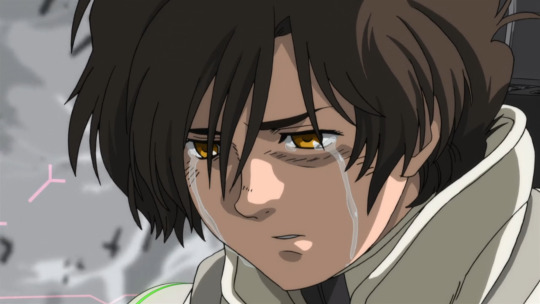
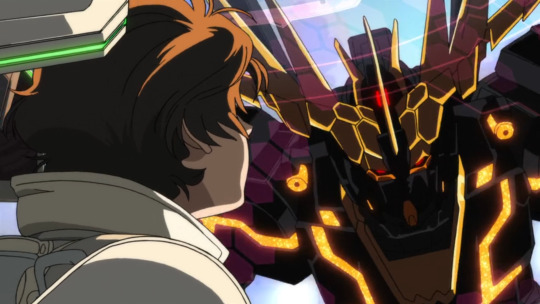
There's nothing particularly objectionable about it, to be clear. It just didn't meet the high expectations the previous episodes had given me. I'd been very impressed by how they never left me disappointed when the credits rolled, and it's a shame to lose that streak.
This was probably inevitable. Unless the narrative is deliberately on a small scale— think War in the Pocket— I tend to prefer my Gundam in a longer format. Seven film-length OVAs were never going to be able to cover everything I would want.
It's hard holding off on researching the production until I finish all the episodes. I'm so curious about what limitations they were working under and the motivations behind various choices.
As always, novel excerpts in this post have been sourced from the English fan translation hosted on Baka-Tsuki, with my own (clearly marked) edits to smooth out grammar or correct any particularly obvious deviations from the Japanese text.
The fan translation is very rough, and I'm not any kind of expert. If you're interested in any of the quotes, I encourage you to do your own research and look at the original text!
(Previous posts: Day of the Unicorn, The Second Coming of Char, The Ghost of Laplace, At the Bottom of the Gravity Well)
Surprisingly, a significant part of what I found disappointing was the visuals. The production values up to this point have been incredibly high, so it just feels wrong for such an intense battle from the book to get scaled back.
Some of this is just a consequence of moving the attack on Torrington to Loni's episode, but not all of it. The fights on the Garuda could easily have played out more like they did in the novel, and it would have helped a lot.
Cool stuff still happens on screen— mobile suits are jumping around in the sky! The Banshee has big crazy claws!— but it's all very sterile in comparison to the original text, which is relentless and chaotic in its violence.
I'm not just complaining about missing out on eye candy; I genuinely think this stuff is important for the themes. The destruction reflects the emotional stakes of what's happening for the characters.
I wish brainwashed Marida had actually killed some people during her big dramatic episode.
A Change in Premise: Who Planned What?
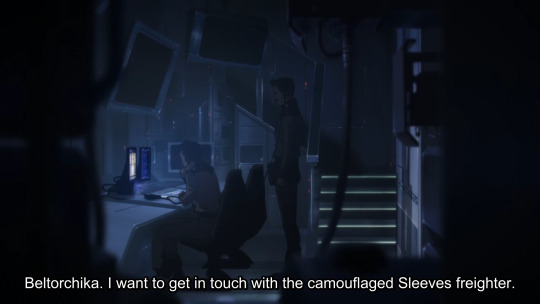
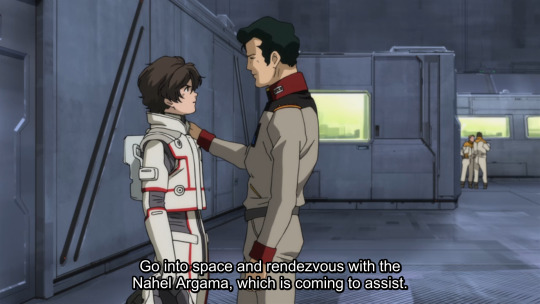
Here's how the OVA plays out: Bright sets up everything beforehand. He makes sure both the Nahel Argama and the Garancieres know the plan and agree to it, and he gives Banagher direct instructions. While there are some unexpected complications, everything ultimately goes according to plan.
The situation in the novel is very different, in that it's a clusterfuck of many people making decisions on the fly as they learn new information. The different groups who ultimately end up working together have very little contact with each other before the attack begins.
This is the setup:
Zinnerman plans the attack on the Ra Cailum at Torrington, with the goal of rescuing Banagher and retrieving the Unicorn. He does not know Mineva is there.
Banagher knows that Mineva is on the Garuda and that Marida is piloting the Banshee. He does not know Zinnerman's team is coming to rescue him. He has a positive opinion of Captain Bright after their conversation in his cell, but does not speak to him after that. He refuses to get in the Unicorn to help the Vist Foundation people move it.
Bright is suspicious of the Vist Foundation and unhappy with their behaviour on his ship. Beltorchika gives him some intel on the Box and the conflict surrounding it, to get him caught up to speed with the audience. She also warns him that the Zeon remnants seem to be mobilizing in the area, so he has some advance warning of the attack. He is aware of the Nahel Argama's location.
The Argama is sitting in orbit, doing nothing. The entire crew is bored and anxious.
Zinnerman only learns where Mineva is after meeting up with Banagher, at which point he has to change the plan on the fly to include rescuing her and Marida. Bright only decides to contact the Argama and tell them to rendezvous with the Garancieres after the fight has already begun. He is not able to tell Banagher or Zinnerman. They learn about Bright's plan for the first time at the literal last minute, when the Argama appears to pick them up.
Zinnerman and his crew see a Federation ship approaching and assume they're being captured, even after being hailed and told otherwise. Ultimately, Banagher and Mineva convince them to stop fleeing and go along with the plan.
The new conceit for the anime is fine. I think the changes they made are clever as a way to streamline events, and I can appreciate that. They clearly put a lot of thought into how the original narrative is structured, and how some plot elements need to move to compensate for the removal of others.
It was probably necessary to fit with the time they were given. I just don't like it as much as the original, unfortunately.
I thought everyone coming together in an environment of total chaos was more interesting than a flawlessly executed plan. Characters had to choose whether or not to trust each other in the heat of the moment, with limited information. In comparison, this new version feels artificially clean.
I also just liked that Zinnerman cared enough about Banagher to rally these scattered Zeon remnant forces for a big battle, with no instruction of any kind from Frontal. He's part of the crew now. 🥺
We lose some specific action moments during the battle— not even counting any of the Torrington stuff that was in the last one instead:
Novel Banagher lays down in front of a truck and lets it drive over him during his escape attempt, before he even knows Zinnerman is coming to get him. Alberto tells his guards they're allowed to shoot Banagher when he's running away so long as he survives, yeesh— the book definitely has more human-scale gunfighting generally. Riddhe actually attacks Banagher, giving us a Delta Plus vs. Unicorn fight.
The consequence of moving Torrington that I care about most is that it means Marida didn't get to participate, so she only really gets to fight Banagher. Seeing her actually killing Zeon soldiers who should have been her comrades did a lot to emphasize both the threat she poses and the effectiveness of her reconditioning.
Reunited, Apart
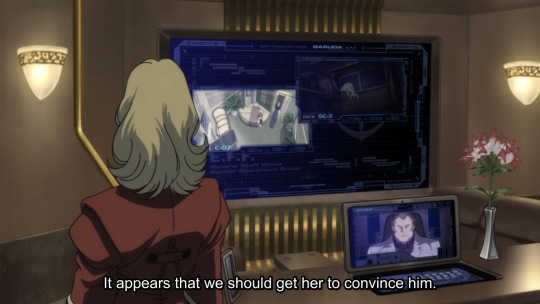
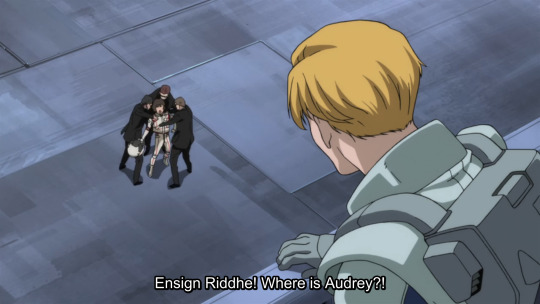
The OVA opens with the Banshee getting the drop on Riddhe and Banagher. It plays out pretty much like the end of novel 6, barring accommodations for the change in setting.
It may be short, but I really like the visuals of this fight. It's fun watching the Delta Plus schmoove about, and I love the lighting at the end.
They kept Riddhe telling Banagher to run here, which was a pleasant surprise. His characterization in the first half of this episode feels significantly more recognizable than like... literally anything else we've seen from him up to this point.
After the fight, we're treated to a sequence of Banagher waking up in the cockpit of the Unicorn and gradually trying to get his bearings. I think it's a really cool framing, and it's another one that's wholly unique to the anime.
A lot of minor dialogue we hear directly in the book is instead silent and left to implication through body language. The meaning is still conveyed very clearly. I thought it was neat.
One example: we get to hear some of what's said to Banagher during the interrogation in the novel. The interrogator is clearly trying to scare him. He claims to be an ex-Titan who got kicked out for torturing too many suspects to death. It's not necessarily notable, just 'flavour'. The silent video feed we see in the OVA gives us the same general information.
The more important part of this scene, which we actually lose, is that Alberto sends the interrogator away so that he can speak with Banagher personally.
Most of the conversation is about their father. Alberto tells Banagher that Cardeas must have enhanced him as a child, making Banagher a Cyber-Newtype. Banagher strongly denies this, but hearing it does plant a seed of anxiety in him going forward:
“You’re really amazing. You have a strong will, [guts], and even the sense [to pilot] the “Unicorn” ... It seems that the Laplace Program’s data can’t be extracted without your neurowaves. Even if we tie you down to the cockpit, nobody else can read the data as long as you don’t agree. When did you learn how to operate it like that?” Banagher [wasn't sure himself]. When Alberto barged into the cockpit, his [immediate] thought was to [make it disappear], [it wasn't something he did by understanding the system]. “Seriously, you’re made too perfectly.” Alberto sighed as he put his elbows on the table. “You [look] like you don’t understand anything, but you’re always in the center of everything. The [situation changes] according to your will; you’re [like] a natural king ... so perfect [it's almost disgusting]. What was unsealed might not be the Laplace Program, but you.” [...] “Don’t you find it weird? You’re too perfect already. As expected of an enhanced human [created by Cardeas.]” “Enhanced…human?” Perhaps you’re the same kind as me.—Marida’s voice, which he heard some time before, suddenly awoke deep within his ears, and he felt goosebumps all over him. “Am I wrong?” Alberto said as his sneer intensified. “When you were in the Vist family, I was in a boarding school, so I don’t know how Cardeas raised you, but…you said before that you don’t have any memories of that time, right?”
Alberto's resentments are obvious. His feelings of inferiority to both Cardeas and Banagher are a major part of his character. The OVA hasn't really shown that side of him at all so far, instead presenting him more straightforwardly as bumbling comic relief.
(Remember, the last time these two spoke Alberto told Banagher that his entire existence is a curse and then tried to kill him. Really, they're both being remarkably civil.)
The family relationships in the OVA are generally less developed than they were in the novels, and I really wish that wasn't the case. The anime cares about family ties, unquestionably— we just had Loni's entire arc about that— but the actual intra-family dynamics between characters are less complicated and less interesting. I think that's a huge loss.
Unicorn is very much about family. The entire conceit hinges on it. The Vist Foundation and Laplace's Box are a pretty substantial bit of retroactive lore to add to the UC timeline, and the reason I'm content to buy into it is that the story does stuff with it, and clearly has things it wants to say. Again, the anime still explores those same themes, but the loss of detail and specificity makes the Vist and the Marcenas families feel more like nebulous plot devices than real groups of people, and I dislike that.
This conversation with Alberto also tells us more about the ideology behind the Box:
“What’s the so called “Laplace Box”? It’s an order. The world’s rules can [be maintained by belief] in this [hidden] “Box”. It’s like a common delusion, an existence that guards people from their selfishness. Once we lose it, the Vist Foundation will not be the only thing that can’t continue. The gears running the world up till now will lose control [as well]. The Dakar incident was [proof] of [that]. If Cardeas never [tried to open] the “Box”, that incident would never have happened. After the chaos of the One Year War, we [have learned] how to control war.” The shadow formed by the lamp caused the slightly arched back to look heinous. That’s the back of someone scared of something. [...] “[...] There is an instinct to fight within humans; as long as society continues to rely on the differences in hierarchy, wars will never disappear from the world. ... Gears to drive the economy, a catharsis that can purge the instinct to fight; without these two factors, humans will continue to start full-scale [wars]. This is a symptom of ill-management of humanity, and it’s impossible to cure [the disease]. We can only think of ways to live with our bad habits.”
The translation combines some sentences in that last paragraph in a way I'm almost certain is incorrect, but I'm not confident in my ability to render it more accurately. Sorry.
The gist is that by carefully managing tensions and allowing occasional smaller-scale conflicts, total annihilation can be avoided. The Box is a tool for this purpose.
Alberto is arguing that the Vist Foundation's goals are a moral imperative, not merely motivated by greed. I cut the paragraph where it comes up, but Banagher gets the impression that he's also trying to convince himself.
Banagher changes the subject to ask about Marida, which catches Alberto off guard. He dodges the question, telling Banagher he should be worrying about himself.
Banagher verbally reiterates his ideals, making it clear that abandoning them is not an option. He names all the people who're counting on him. There's a precursor to his conversation with Bright, where he thinks about the helplessness of the individual and the strength that comes from relationships and connection.
Alberto dismisses Banagher's conviction as Cyber-Newtype brainwashing— and it's clear that the idea had also occurred to Banagher. There's a discomfort taking root about the nature of identity, the self, and the way human beings are inherently shaped (and sometimes deliberately manipulated) by others. Connection with other people is vital, but also frightening.
My final note on this conversation: Banagher and Alberto both frequently describe each other as looking or acting like their father. They usually only compare themselves to him in the context of difference, generally with the subtext that these differences are something that makes them insufficient. Ouch.
There are more differences during this period of captivity. For one thing, Mineva is held on the Ra Cailum before they move her to the Garuda. There's a 'so close yet so far' dynamic where our three protagonists are finally all in the same location again, and they all know it, yet they are totally isolated from one another.
Banagher and Riddhe both get scenes where they chase after Mineva, and in both cases Marida intervenes and prevents their meeting. She almost chokes Banagher out, it's very dramatic.
Banagher and Riddhe manage to meet very briefly. They don't get the opportunity to talk for long; the scene takes place when Banagher has just escaped his room and is being chased by Vist Foundation goons. Riddhe deliberately creates a distraction to allow Banagher to pursue Mineva.
Compare this passage to the closest anime equivalent, where Banagher calls out to Riddhe and Riddhe just turns and walks away:
He ... turned right, and nearly knocked into someone else running [toward him]. “You’re…!” The young man dodged behind to avoid a head-on collision, and widened his eyes. “Mr Riddhe…” Banagher muttered, but the pursuers’ footsteps caused him to look back again. He immediately grabbed Riddhe’s uniform and pulled him over, “Ensign Riddhe. Audrey’s on this ship now. The Vist Foundation wants to use her as a hostage.” “Hostage…!?” Riddhe gasped, and lifted his [chin]. “Wait!” “Oi, get that guy!” the yells came from the corridor behind Banagher, and he gave a pleading stare at Riddhe. It’s all on you. If it’s you, you’ll definitely be able to understand. Banagher had relied on Riddhe when their mobile suits interacted with each [other. He] looked at [Riddhe's face and saw him gritting] his teeth. Riddhe lowered his brown eyes, and [turned away with] a bitter expression. “…Go,” he muttered with a barely audible voice, and took the fire extinguisher installed on the wall. “The mobile suit deck’s straight ahead. Hurry.” Riddhe informed Banagher, who did not have the time to thank [him] as he darted forward. The sound of the fire extinguisher being sprayed [overlapped with] the pursuers’ [approaching] footsteps. "Hurry up!" echoed down the hallway, breaking through the agitated voices of the guards. ...
I don't mind the anime scene, and I actually think it's still well within the bounds of things the original Riddhe could plausibly do. It's just another example of him clearly playing a different role in the adaptation than the original text.
Returning Characters and Cameos

The Bright-centric scene that I consider most thematically important is his talk with Banagher, which is essentially the same in both versions. The only real difference is that the novel shows the audience Banagher's internal thoughts, many of which are about things that aren't in the anime anyway (such as his conversation with Alberto, and specifically Alberto's claim that Banagher must be a Cyber Newtype).
I like this scene, and being unchanged means I don't have much to say about it. It was nice.
I'll be honest: I wish Bright was in this episode less. Making him the mastermind behind everything that goes down inflates his individual importance— and screentime— relative to other characters.
The bit where he came back and talked to Banagher a second time to tell him the plan was the tipping point for me, I think. I was sitting there thinking 'Again? Fucking again?'
I just don't think it's a good use of time, and it rubbed me the wrong way in the context of how much other stuff I thought was important didn't make the cut.
I love Bright— and when I want to see him, there are three other tv shows and a movie I can go rewatch to do just that. When time is clearly extremely limited, I think the priority should be developing the characters that originated in Unicorn.
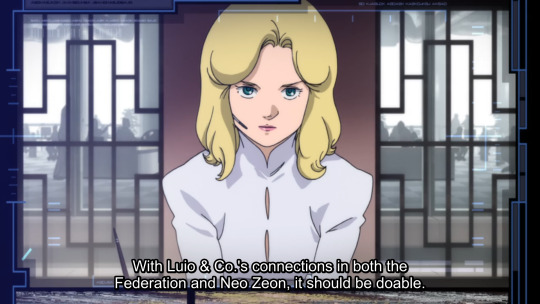
Bright's scene with Beltorchika is quite different. Aside from her giving different information due to changes in premise, the conversation is very streamlined. I'm fine with it, but it does make her presence kind of... perfunctory?
The information Beltorchika provides is necessary for plot progression in both versions, but the actual character interactions that made it matter that she's the one delivering it have been removed in the anime.
Bright contacts Luio & Co. by private mail with the recipient listed as Hayato Kobayashi, seeking more information about the Box. Later, Beltorchika is the one who responds to deliver the results of the investigation, stating that she is acting in lieu of Stephanie.
Bright was not expecting her. While he obviously knows who she is, this is the first time they've actually met.
Instead of telling him about the General Revil, she warns him about the movements of the Zeon remnants and the possibility of an attack on Torrington base and the Ra Cailum. She makes it clear that she's telling him this unofficially, and not on behalf of Luio & Co.
The novel version of this scene is very much about the Amuro-shaped void in the room.
Beltorchika used her hand to tidy her blond hair that was cut short and gave a somewhat stiff smile. (Because of my relations with [Karaba], senior manager Stephanie has been taking care of me, and Mr Kai Shiden would often come by too.) “Oh…it sounds like there’s quite a few people both you and I [know]."
[...]
The reason why both sides could not show their honest smiles was probably because of the huge hollow they saw in each other, the man called Amuro Ray.
[...]
“What happened to Lieutenant Amuro was a pity.” ... This insensitive line would touch upon a person’s old wounds, but Bright believed if [it caused] Beltorchika to waver, he could be certain that it was best not to trust in her abilities. He realized that he was doing something cruel as he hid his sense of guilt ... with a nonchalant look. Beltorchika herself merely [looked him over carefully], then chuckled. (It’s Commander Amuro, right?) [...] “Ah, you’re right. Sorry.” (You don’t have to think for my sake. We used to be deeply in love with each other, and then we broke up. I heard he died in battle during “Char’s Counterattack”, and I was depressed for a while…but his body wasn’t discovered, right?) “Yes…” (Isn’t him being MIA after the battle against his arch-nemesis Char a suitable ending for a romantic like him? Up till now, I sometimes feel that he should be alive, somewhere. Even if we lose the shell of the human called Amuro, I do feel that his heart has merged with space…) Beltorchika looked like she was staring in the distance as she narrowed her eyes, and Bright felt that these words of her were not forced. The brat who’s always crying about on “White Base” had become a man who made a woman show this expression? Bright was suddenly overcome by grief as he too looked afar, and Beltorchika chuckled, saying, (You’re just like what Amuro said, always worrying.) ...
She also makes him feel old after he starts lamenting about how he thinks the world is getting worse because nobody believes in anything anymore.
(I do understand what you mean, but I can’t accept this way of thinking. Your words seem to imply that it’s alright to start wars as long as we have our own ideals.) On hearing this direct refute, he felt that someone just poked him in the head. (I’m sorry. I’m someone who speaks too much. Amuro used to remind me of this habit I have.) Beltorchika said, but the glance she shot through the monitor showed that she had no intent of retracting her words. Bright was shocked that he was unabashed in beautifying the past and criticizing the present, and that perhaps was the proof that he was advanced in age. “No, I was insensitive in my choice of words. My wife often reproves me regarding this too.”
lol

While he is briefly name-dropped by Beltorchika, Kai does not appear in the seventh novel, and he has no contact with the Garancieres. His big scene is in Volume 8, where he speaks to Ronan Marcenas. It's fairly substantial.
It begins with Kai arriving in Dakar, giving us a look at how things are on the ground in the aftermath of the attack. It's a nice, evocative bit of scene-setting. He sees the remains of the Shamblo being disassembled, still lying in the street. The destruction is so severe that it looks like areas the Shamblo passed through have been carpet bombed. Emergency rescue and clean-up teams are still searching for survivors buried under the rubble. Armed soldiers and mobile suits have a strong presence.
The Shamblo never made it to Parliament, but the building still sustained some indirect damage from tremors during the attack. Repair crews are present, coming and going while everyone else still works in the slightly fucked up building as usual. The phones are ringing off the hooks.
When Kai arrives, he is greeted by Patrick Marcenas (Cynthia's husband / Riddhe's brother-in-law).
Patrick is a fan of Kai as a member of the White Base and seems a little star-struck. He gets embarrassed when Kai wryly tells him not to believe everything he reads.
In his office, Ronan is watching a televised speech by Monaghan Bakharo, the Defense Minister of the Zeon Republic. Bakharo denounces the attack on Dakar and denies all involvement or association with Neo Zeon / Sleeves.
I'm not sure how the tone is meant to read in Japanese, but as rendered in English it comes off very insincere and backhanded. Like, he's denouncing Zeon's past misdeeds, but also simultaneously justifying them and complaining that it's unfair that everyone is still being mean about it.
Kai arrives during this. Ronan gives some political commentary, basically saying that Bakharo is full of shit, then turns off the tv so they can have their conversation. He makes it clear that he is offering information.
Kai acts politely disinterested until Ronan asks if he has heard of Laplace's Box, which manages to shake his composure. He doesn't know much, but he has heard rumours. One of his reporter acquaintances seemingly disappeared after attempting to publish a series of articles on the subject, and the magazine that published the first piece went out of business soon after.
Ronan says he has evidence that the Vist Foundation is interfering with the Senate Council. He explains their goal of preventing the release of the Box, and the connection between the Box and recent battles with Neo Zeon.
He offers to provide Kai with a list of Senate Council members involved with the Foundation. He assures Kai that he will do everything in his power to ensure Kai's personal safety.
Kai is keenly aware that Ronan isn't whistleblowing for principled reasons, but rather wants to use Kai's platform for his own benefit. Ronan tries to appeal to Kai's hatred of Zeon, and emphasizes the importance of ensuring stability and safety to prevent it rising again.
Ultimately, Kai is not interested in being used as a politician's propaganda tool, and he doesn't have much respect for Ronan. He tells Ronan that he researched his career beore he arrived, and proceeds to give him a scathing review— the gist being that Ronan was a left-liberal politician who flirted with big, radical ideas, then moved right over time after being elected.
When he goes to leave, Ronan namedrops Bright as a last-ditch effort, with an offer somewhere in the territory between a bribe and threat (basically, 'I can help him keep his position as Commander now that he's involved with the Box and causing trouble... but only if we root out the conspirators with the Foundation in the Senate.')
Kai is pissed. He tells Ronan that he's shameless and pathetic, and that this is probably why Riddhe ran away from home. Jesus, Kai, were you just keeping that one in your back pocket in case you needed to bully him?
Ronan is too stunned to respond, so Kai gets the last word. The scene ends with Ronan looking at a photo of Riddhe on the wall. It's not the one we see in the anime, but one that feels a little more sinister:
There was his wife, narrowing her eyes [as if to say] that the sunlight in Africa was too strong, Cynthia, who was in the vibrancy of her youth, and Riddhe, who was less than 10 years old. As Ronan stood there, unable to show a sincere smile once he started to understand the rule that this world could not change, Riddhe was showing a weird stiff smile beside him. At that time, he would mimic Ronan’s own actions which he somehow saw, and was often reprimanded by his mother. In fact, Riddhe, who seemed to be giving an adult-manufactured smile, looked just as pitiful as Ronan was. Right, that child understood. Ronan looked at the door and imagined Kai’s back on it, telling himself the words he could not say out. That child understood everything and accepted the destiny of the Marcenas family. I let that child bear the burden of the “Box”. I wanted to change everything in this generation, but I couldn’t do anything, and added the burden of my father and grandfather upon him. Ever since the battle of Torrington, there was no news of Riddhe. His “Delta Plus” was reclaimed safely, so he probably was not hurt. This news alone was enough for Ronan. No matter where Riddhe was, no matter what happened to him, he would not betray the Marcenas’ destiny. Even though others could not understand, he could firmly believe so.
Kai appears again very briefly in Novel 10, when he calls Bright and tells him about his conversation with Ronan.
Martha and Mineva: Negotiation
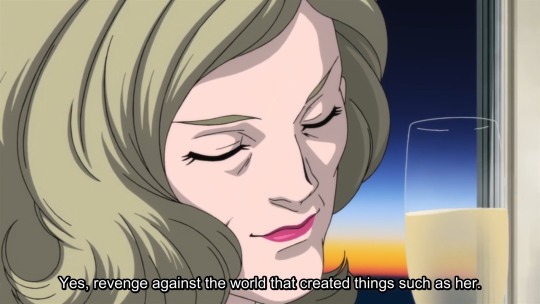
This line is important. Banagher thinks the same thing almost word for word about Frontal later. People generally seem very aware of how referential Unicorn is to previous Gundam media, but sometimes I wonder if it's obvious to anime-only watchers just how referential it is within itself? The whole narrative is a funhouse hall of mirrors. Everyone is always reflecting at least one other person, and usually more. Characters bleed into each other in other characters' perceptions, both implicitly and explicitly. I say Frontal is my favourite, because he is— but when I think about Unicorn, I'm usually thinking about the ensemble cast as a unit. They're deeply enmeshed. I think this is why the mangling of Riddhe threw me so badly before I had even fully realized that I cared about him and why— if you move one of the mirrors without compensating for it elsewhere, the illusion breaks.
Martha and Mineva's negotiations happen in the novel before they move to the Garuda. The scene takes place on the Ra Cailum, in the unused Commander's room.
One irrelevant but extremely funny detail is that Martha started a feud with Bright over her accommodations, because she originally wanted to stay in that room specifically:
[The VIP room] was the last arrangement Captain Bright made when Martha demanded to have the commander room. As the commander and captain, Bright was staying inside the captain’s room, and the commander’s room that was often kept empty should be okay for anyone’s use, but this was a serious problem to the military. The disputes between Martha and Bright had been becoming a common scene to the crew, but it could be said that this room was the start of the dispute between the two.
I'm not sure if this was meant to be implied in the anime or not, but Mineva is on a hunger strike and refuses to eat or drink anything but water while being held captive, so she's quite physically weak during this scene.
Martha tries harder to be "friendly" in the novel. She's playing fake nice in the anime, obviously, but there's a professional distance there. Novel Martha gets up in Mineva's space— whispering in her ear, putting an arm around her shoulder, saying some truly bizarre shit about wombs... the vibes of this conversation are rancid either way, but the over-familiarity is a slightly different genre of red flag.
I think these are good changes, especially since they've already changed the tone of Martha's character by choosing to omit her sexual abuse of Alberto. The original characterization might feel incongruent with New Martha, leaving aside all question of whether or not the way she was originally written was "good".
God, I still really love reading most of Martha's novel scenes, so long as she isn't directly alone in the same room as Alberto. She has just the right mix of traits for a petty, 'shit-stirrer' antagonist that I love to watch bounce off other people: highly perceptive but still unable to truly understand other people; deeply angry about being wronged but perfectly happy to take advantage of others; carefully manicured and put together until suddenly she's not.
She's a creep. She's morally repulsive. She's mean, and she knows exactly how to pinpoint a person's vulnerabilities, but she's also constantly letting her own bizarre preoccupations bleed into the conversation.
The way she's written and described is, unfortunately, almost always some level of misogynist in its framing— and her bizarre preoccupations as a person are arguably also Fukui's bizarre preoccupations as an author.
And yet.
Later, after Martha leaves, the OVA shows us a flashback of a champagne glass breaking, and we hear Martha chastising Mineva for rejecting her proposal. The implication is that Martha's facade eventually shattered, and she threw the glass in a fit of rage. The novel shows us this directly.
This means we get to hear the specific thing Mineva said that got under Martha's skin, which is, uh... maybe it's easier to just show you.
Martha is doing her spiel about the innate biological superiority of women and the importance of The Womb, and then we get this exchange:
“Miss Martha, do you have children?” The interrupting voice caused Martha’s fingers, resting on Mineva’s shoulder, to tremble. “Two of them. why?” Upon hearing the stiff tone, Mineva felt the reason by the chill in her heart, “Are they the children you bore?” she started to ask with a personal tone. “…What do you mean?” “I don’t understand what kind of person my mother is, and that’s because she [died] before I could remember. However, [I still remember the way she felt]. [A woman who has become a mother, or who has the qualities to become one,] will give off that sort of gentle presence. I can’t sense that maternal presence from you.” Martha’s expression immediately changed as she stumbled backwards. Mineva saw the suit that showed the other woman’s bodyline, realized that she obviously put in her utmost effort to maintain her skin so as to prevent people from realizing her age, ... [This woman played the role of] a clever tactician, [but there was something childish about her]. Her girlish ideals and grudges had [festered, rotting down to the root], and [she seemed to have] lost something as she [grew older]. She talked of her knowledge of humans, but she never understood people, and did not intend to understand them. Martha was a hypocrite of a reformer. Mineva stood up and looked in front, feeling that there was no need for her to be afraid. Martha wanted to maintain [her] footing, but could not do so, and stumbled backwards again as Mineva glared at her with her clearly hostile eyes. “You denied the logic of men, and yet used that to conquer Marida. It’s possible if you explained that it was the ruthlessness of women at work, but you’re acting just like a man when you’re using that excuse to rationalize your knowledge. You’re not the kind of woman you say. Of course, you’re not a man. You’re just using the tone of a man to exercise the cruelty of a woman, a conman who uses whatever indecent weapons—” Something grazed past Mineva’s face before she could finish, and a sharp sound glided past the sky as it entered her ears. The shrill sound of the glass breaking rang from behind, and the Foundation subordinates in black charged into the room, perhaps because they realized that there was something amiss in the situation. Mineva stared at Martha, not moving at all, ...
...There's a lot going on here.
I've gone back and forth on whether the implication is just that Martha is unwilling to actually go through the difficulties of pregnancy despite her posturing, or if we're supposed to assume her reaction implies some kind of complex about infertility.
I feel like the former makes more immediate sense and is the less weird option of the two, but the latter would have some interesting implications on a character level, in that it could be a reason for her to genuinely see herself in Marida.
Even if that were the case, it would be a false understanding. Martha considers the projection of her own desires onto Marida more important than Marida's actual personhood.
One last thing I want to mention is that the original version of Martha is extremely angry and resentful.
It was too cold to call them martyrs, the Zeon soldier that disappeared in the explosion, and Marida, who was mind-controlled to kill her comrade— “How impressive.” Martha, who unknowingly got behind her, had the color of fire reflected in her eyes [...] “The self-satisfaction men have will all—be severed by her sword.” Martha clenched her hand that was pressing against the window, seemingly wanting to [crush] something in her hand. At that moment, Mineva had a feeling that it was this vengeance that was driving Martha, and the rage within Marida’s heart was driven by this poison, ...
If anime Martha is meant to be bitter and vengeful like this, then she's much better at hiding it. Her greed and ambition are central, and whatever sincere emotion or vulnerability she might theoretically have is entirely concealed from us.
The Riddhe Section
As I've said previously: in the first half of this episode, Riddhe feels more like himself (and generally more interesting to me) than he did in the first four. Then, around the 30 minute mark, he has a single line of dialogue that implies a dramatically different ideological viewpoint and motivation. It's honestly kind of fascinating.
I'm not mad about it. At this point, I've resigned myself to the fact I'm dealing with a different character. I'm just surprised, and wondering about the reasoning behind the choice— they pretty much completely inverted the nature of Riddhe's hostility to Newtypes.
The breakdown Riddhe has after Mineva's jump from the Garuda is also different from its novel counterpart. I actually enjoyed it a lot, mostly because it's fucking silly. A character who is unhinged in a way that makes me laugh is an improvement over one who vacillates between being boring and making me angry.
Novel Riddhe doesn't necessarily have a clear over-the-top moment where he 'snaps' like this after Mineva's rejection. His instability becomes obvious long before this point, but he doesn't go violently out of control like this until the climax of his arc. It's a gradual but inescapable downward spiral, with fewer dramatic hard drops.
Riddhe, Alberto, and Marida
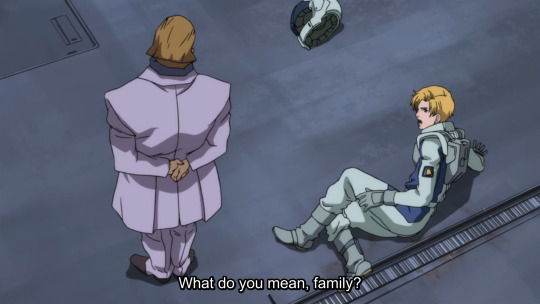
The Alberto-Marida-Riddhe dynamic is fascinating in the book, and there's much less of it in the anime. This scene here is still an important one for Riddhe, though.
The novel equivalent is told from Alberto's perspective, and it opens with him talking to Marida before Riddhe appears. It also happens a bit later than it does in the anime, after Banagher has already been interrogated and had his first escape attempt.
Since running into Banagher, Marida has been having a harder time connecting with the Banshee. Her physical symptoms have worsened, with more frequent headaches. Alberto is worried about her, and tries to tell her not to push herself too hard. The moment has a very different tone than the anime version, which mostly seemed to be played for laughs.
Novel Alberto is deeply disturbed and upset by Marida's blankness. There's a callback to an incredibly vile innuendo from Martha about "playing with dolls," and remembering it upsets him so much he yells at Marida, trying to make her understand the seriousness of what he's saying. She just responds with flat, uncomprehending obedience.
Riddhe enters, interrupting Alberto's one-sided argument. His reaction to Marida is interesting.
“It confounds me to think that this lady here is a Cyber-Newtype.” Riddhe said as he frowned and approached Alberto. Since when has that guy been standing there watching? Alberto resisted the urge to click his tongue and turned to face Riddhe, ostensibly trying to block Marida’s sights. “She’s most likely a kidnapped orphan, am I right? Does the Vist Foundation deal with human trafficking too?”
Riddhe asks to see Mineva, then Banagher when this is denied. This is when Alberto tells Riddhe that Banagher is his half-brother. He's deliberately trying to break Riddhe and Banagher's friendship, because he knows Riddhe tried to help Banagher escape.
Riddhe's reaction is more outwardly dramatic than in the OVA. He crumples, bracing himself against the wall so he doesn't collapse— he wasn't thrown by Marida, so he's still standing— and then starts laughing bitterly and saying cryptic things about the history of the Vist Foundation.
I think this would feel very weird and out of place in the context of the anime, so it's good they cut it, but I did like it as a scene in the book. It makes for a nice little chapter cliffhanger, where Alberto realizes that Riddhe seems to know what's in the Box.

Later, Riddhe meets Marida and Alberto a second time.
The scene takes place in the hangar bay while the Unicorn is being moved. As he watches, Riddhe thinks about Banagher— until he catches sight of Mineva, who is also being transported. Riddhe calls out and attempts to go to her, but Alberto and Marida get in his way.
The white frame of the “Unicorn” was lifted by the two “Jestas” and laid down horizontally on the trailer, [...] Unlike the “Banshee” that was moving into the “Medea” on its own, the “Unicorn” was dragged over by the trailer, and the reason for this was due to the only pilot, Banagher, refusing to work with the Vist Foundation. That’s his style alright… he thought, but [he] felt Alberto’s words appear in his mind again, and bit his lips [alone] in the [cockpit.] His rational side was telling himself that there was no reason for him to feel angry, but he could not [help but feel] cheated, and [an uncontrollable frustration] continued to swirl in his heart. That guy [seemed like an ordinary person who] simply got involved in this [by chance]—no, there was already an [unsual feeling] about him right from the beginning. If he really has the Vist bloodline, I can only describe my two battles alongside him as ironic. He’s supposed to belong to the other side, but I got fooled by him saying ‘you’re a man of your word’, and ended up [learning the truth about] my cursed family. I’m like a clown performing ...
[...]
... just when he wanted to shake [this] thought from his mind and [refocus] on the inspection, a [flash of] familiar chestnut-colored hair appeared in the corner of his [vision,] and he felt his [heart that had been pounding suddenly go] silent.
[...]
... Riddhe got down to the deck and yelled, “IT’S ME, AUDREY!” as he leapt off the gondola. Mineva’s eyes widened as she looked back, and she [tried] to break away from the ranks, [but she was] restrained by the subordinates in black suits. Riddhe [ignored] Martha’s piercing stare ... as he continued to dash down the mobile suit deck.
[...]
[Just] when Riddhe was about to see [Mineva's] face, [Alberto interrupted.] “How troublesome”, [he] said as he [stepped in front]. “I should have told you that you’re not to see her, Ensign Riddhe.”
I love this whole section, even through the garbled grammar. It hurt me to trim it down, but I can't justify all that text.
Alberto and Riddhe argue. Marida steps between them when Riddhe gets too close. He tries to push her out of his way, but she dodges and throws him to the ground. When he gets up and fights back, she starts trying to choke him like she did to Banagher earlier. However, the fight ends abruptly when something triggers one of Marida's headaches, and she collapses in pain.
Alberto rushes over to Marida's side and orders his subordinates to fetch Bentner, the Cyber-Newtype researcher who facilitated Marida's reconditioning. Alberto clearly wants to help her, but his only solution is asserting control and further reinforcing her brainwashing. He soothes Marida by walking her through her 'Gundam is the enemy' mantra. Riddhe is still there, watching this happen and getting increasingly creeped out.
It's heavily implied that what Marida is actually reacting to is Zinnerman's approach. The scene ends with an alarm going off, as the Neo Zeon attack finally begins.
Unlike the reader, Riddhe doesn't know what's happening yet— but he has a bad gut feeling. When the alarm rings, he books it straight for the Delta Plus, without even bothering to wait for Bright's announcement.
Newtypes, Cyber and Otherwise
Let's back up for a moment and get some more context on Riddhe and Marida, since what he thinks of her is relevant to his later interactions with both Banagher and Mineva.
What does Riddhe know about Cyber-Newtypes? Not necessarily a whole lot. He's heard what the crew of the Ra Cailum think, though, and their perception seems to be that getting enhanced may as well be a lobotomy.
“Cyber-Newtypes…” Daryl’s face suddenly turned pale as he muttered this. “With those guys from the Newtype research institute around, I guess you’re right.” “You mean that if we end up becoming this thing’s pilot, we might end up being enhanced…?” Watts whispered as he looked at the back of the pilot who disappeared behind the cockpit hatch. There was already a rumor amongst pilots that a Cyber-Newtype was a synonym of being a vegetable. Then what about Banagher? Riddhe pondered, and then shook off this question without an answer ...
This is Riddhe's starting point, before he ever interacts with Marida. It's a bad first impression, and it doesn't get better.
His narration compares her to a guard dog. He calls her a puppet. When he recognizes her as a person, it's generally in the context of a person who is being or has already been destroyed— a kidnapped orphan; a brief flash of emotion in the eyes that fades to nothing. Empathy is overridden by disgust for what was done to her.
Riddhe doesn't know much about Cyber-Newtypes, but he thinks the decision to make them was morally repulsive.
So, what about "natural" Newtypes?
Trick question.
Novel Riddhe doesn't think Newtypes are real.
He has an entire back and forth with Banagher about how fake they are. You can imagine my surprise when "the revelation that Newtypes really exist" came out of his mouth in the anime.
"Newtype" as a word has a lot of historical and political baggage in-universe. It refers to multiple different concepts that are loosely related but not identical, and they're often conflated.
Do you remember the first episode, when Banagher is in class? This is what we hear of the lecture:
They claim to desire autonomy for the Spacenoids, but at their heart you will still find the same ideas of the inherent superiority of the chosen elite found in the philosophy of Gihren Zabi. The concept of Zeonism proposed by Zeon Deikun, the so-called 'Newtype' ideology, was a dangerous belief that ultimately produced rebellious elements such as these.
This is Riddhe's position— Newtypes are just Zeon's equivalent of the Nazi Übermensch. It's an ideological concept, and only real insofar as humans have made it so through enhancement.
He isn't disturbed by the Box because he considers it proof of Newtypes being real; he's disturbed by it as a propaganda tool for Neo Zeon that would strengthen belief in a harmful myth.
Riddhe is terrified of Zeon. It doesn't matter if he's sympathetic to spacenoid rights and disdainful of his father's politics; Zeon is still the greater evil. He's able to make an exception for Mineva because she's acting against her own government on moral grounds, and her words moved him.
That's how Riddhe felt at the start of the series, when he still had an optimistic outlook. He's been thoroughly disillusioned by this point, and just recently spent half a novel watching people die at ground zero of a terrorist attack carried out by Neo Zeon.
This is how Riddhe describes Newtypes during his confrontation with Banagher:
(Zeon is the tumor born from twisted idealism of the Space Migration Issues. This Newtype thinking is just a fantasy they have, and a virus that divided humanity into two after humanity nearly united. If we don’t eradicate them, there won’t be peace…!)
"A fantasy." Not a real phenomenon.
It makes sense that Riddhe would think it's bullshit. We can assume this was probably also true in the anime at first, even if his political beliefs are less developed— we've already established that Newtypes being fake is a mainstream position that gets taught in schools.
The point of divergence is that OVA Riddhe is apparently convinced that Newtypes are real when he learns the truth about the contents of Laplace's Box.
... Why, exactly? Did Ronan tell him that's what it means? Did he come to that conclusion on his own?
I know characters can be fallible and believe things that are wrong, but I literally already know what the Box is, and it doesn't prove anything about Newtypes. Riddhe already has vested emotional interest in them being a myth, so it seems strange to me that he would change his mind without undeniable evidence.
It could be they were trying to make his motivation simpler, so that he wouldn't have to spend time explaining it? The concept of Earth society and "Oldtypes" feeling threatened by the emergence of "Newtypes" has already been raised by other characters, so the writers might have felt it would be self-explanatory.
It strikes me as a dubious choice from a storytelling perspective, even if they don't care about making Riddhe look a bit dim. Sure, we've already seen other characters speculate about the Box, but Riddhe is the first character who we know is aware of the contents to make a specific claim about what's in there. The audience is reasonably going to assume what he's saying is accurate, and I think setting up that kind of false expectation is a mistake.
I've always assumed learning about the contents of the Box is intentionally meant to be a bit underwhelming for the audience, because the ossified political structures around it were more important and dangerous than the thing itself. I just think this particular implication feels more like a bait-and-switch that could lead to disappointment, rather than realization. I dunno.
Anyway: Riddhe hates Zeon. Riddhe is traumatized after Neo Zeon's attack on Dakar. Now Neo Zeon is attacking again— and Banagher is co-operating with them.
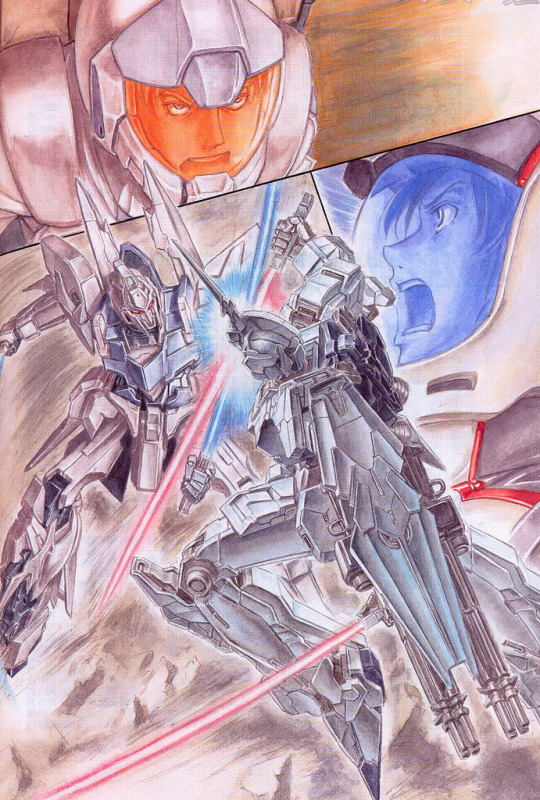
(Banagher! Have you really become a Neo Zeon member…!?) The solid anger pierced through the armor of the machine and came right at Banagher. It was a stubborn will that was overly stiff, one that felt impossible to communicate it. ... [Banagher] could sense all warmth of the human called Riddhe disappear as he pulled the control stick in the moment of extreme stress. ... Now’s not the time for this. Banagher felt that the distance between both of them was very far, and gritted his teeth anxiously.
[...]
“You’re saying the same things as the people of the Vist Foundation, Ensign Riddhe. You courageously brought Audrey back to Earth, so why…!” (That Riddhe Marcenas is dead.) ... (I don’t have the power to save the world. Even if order is incomplete here, I’ll protect it if there’s no way to [change] it. That way, I can protect Mineva too…!)
[...]
The humanoid that leapt from the barren land instantly transformed into a wave rider and entered the clouds. If I let him go like this, he’ll really become an enemy. Banagher was driven by the anxiety in him, “Mr Riddhe, wait…!” and called out. (Are you alright, Banagher?) however, upon hearing this call from Zinnerman, he looked back at the sky again, and spotted the homebase-shaped machine of the “DO-DAI Kai” approach him.
I cut a lot here, both action and dialogue. I skipped over the parts where he talks about Newtypes and Zeon, since I already quoted them previously.
These are the details I think are most relevant:
Riddhe's belief— and anger— that Banagher has joined Neo Zeon
His loss of faith that the system can meaningfully be changed
His description of his previous self as dead
The official severance of his relationship with Banagher.
I do think what the anime did, having him catch on to what's happening and conclude "they're all working together," was a smart way to spur him into action. It fosters a similar sense of frustration, betrayal, and paranoia.
God, though, he just feels so much less connected to Banagher in the anime. I thought this was one of the more interesting episodes for their relationship, and the most direct interaction they had was Riddhe ignoring Banagher calling out to him and walking away.
After the fight with Banagher, Riddhe immediately heads for the Garuda, where he confronts Martha and Alberto. This scene plays out fairly similarly at first, with a few tweaks.

First: Riddhe pulls a gun on them immediately.
Second: Martha is not at all worried about the idea of killing Ronan Marcenas' son. It would be an easy cover-up. Soldiers die all the time during battles like this, no matter how important their daddies are.
She backs down when Riddhe tells her that he's recording the conversation, and that the Delta Plus would automatically transmit the contents of its black box if it was destroyed.
Third: Riddhe's paranoia about Zeon now extends to Mineva, even if his entire reason for doing this at all is supposedly to keep her safe. He snaps at her about her loyalties when she presses him for information about the box. When she pleads with him further and reminds him why he brought her to Earth in the first place, he reiterates his previous proposal— Join our family. Renounce Zeon. Prove I can trust you. He doesn't seem to actually expect her to agree, and she obviously doesn't.
I'm so glad he didn't do this in the anime, holy shit. I was sure it was coming and dreading it. After how they changed the first proposal scene to be so much more weird and aggressive, it would have pissed me off to hear it again.
Everything else he says during this scene is roughly the same, up until "the revelation that Newtypes really exist." I've already explained that novel Riddhe doesn't believe in Newtypes, but he definitely wouldn't have told Mineva about it right now if he did.
This scene is told from Mineva's perspective, as with most of the scenes with her and Riddhe. We get more insight into how she's feeling. Her actions and dialogue differ from the anime in several ways.
Points of interest:
Mineva still feels the general "Newtype pull" from Riddhe. She has to actively resist just automatically doing what he tells her, even now that his behaviour has changed to become closed off and aggressive.
Mineva is feeling genuinely angry toward Riddhe, which has never been the case until this scene.
Mineva specifically confronts Riddhe about how his idea of protecting her is just keeping her locked away in his family's house while he handles everything himself. He doesn't seem to understand why she needs to talk about this before she's willing to follow him.
Mineva doesn't just slip away during the commotion of Neo Zeon boarding the Garuda— first, she refuses to leave with Riddhe. Then she elbows him in the gut when he isn't expecting it, steals his gun, and tries to use it to get away from Martha and her goons. lol
And the big one, that I really wish had made it into the anime:
Riddhe's lack of empathy for Marida is the reason she ultimately decides not to go with him.
“Let’s go.” Mineva’s shoulder was grabbed unexpectedly, and Riddhe’s face appeared in the direction she was being pulled towards. He forgot to control his strength, and even if it may be caused by anxiety, this caused her to feel a little repulsed. “There’s no reason for you to be here. Come with me.” “But Banagher and Marida are still…” “Marida? Are you referring to that puppet?” Riddhe [said simply.] [Mineva’s body inadvertently tensed up, and at that moment there was] the sound of something breaking ... as the Medea transport carrier, fastened at the rear hatch, tilted drastically.
...
“It’s dangerous here, let’s go!” Mineva saw the growling Riddhe’s face as he grabbed her arm, and instinctively shook his hand away. “Audrey…?” “Ensign Riddhe, I understand your good intentions, but I can’t leave with you now.” Mineva understood very well that Riddhe did not have any malice, but he would choose to abandon Marida like a puppet without care, and that was [not] something the old him would do. This man who used to be so understanding ignored all that he could see in the past because he tried to kill his old self, but even with that factored in, the pull he had was not enough for Mineva to entrust her life to. ... ... If she went with him at this point, [they] would simply fall into the abyss together—no, that was not the reason. Perhaps it was the feminine aspect within her that gave her the instant conclusion [that] this man was not someone she was willing to go down with.
Mineva's Jump
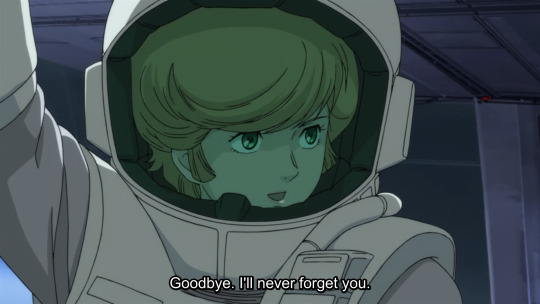
This smile is the first time I felt convinced that OVA Mineva might have ever had a positive thought about Riddhe. That's kind of nuts, given this scene is supposed to be the culmination of her finally deciding that caring about him and believing he has good intentions is not enough. Still, it's... nice that they kept this line? A little humanizing moment for both of them? An actual hint that there was anything positive about this relationship for Mineva?
The way this scene is described in the novel is more harrowing, since we actually witness the moment the Garuda tears and Mineva gets stuck holding onto that steel frame. She's also wearing normal civilian clothes still, not a protective suit. The floor is warped and falling apart, so Riddhe getting over to her is more precarious.
Again the scene is told from Mineva's perspective, so we see her thoughts as she makes her decision.
She can feel the psychoframe resonance from the Unicorn and the Banshee fighting. She concludes that Banagher will definitely be able to hear her thoughts, because he's in a machine specifically designed for that purpose.
She also considers the jump to be a test, to prove to herself that she's following the right path.
I know that this choice [is] illogical, but the hand I want is in that light. Maybe nothing can be done, maybe we’ll just die with regret, but this is a test to me—a test to see whether [someone so small can affect the fate of] the world.

This is what romance is, to me.
After Mineva's jump, all of Riddhe's appearances for the rest of the episode are anime-original. The fixation on the Gundam as an object of hatred is new. They basically made him do the same thing Marida does, with the verbal repetition, which is interesting. I hope they play up that comparison more.
Novel Riddhe resents the Unicorn and the Banshee for their ties to the Box and the Vist Foundation, but he never responds to them with this kind of mindless rage. He actually doesn't get angry at all during the immediate aftermath of Mineva's rejection. Maybe he would have if he'd been left to his own devices long enough, who knows— he gets taken out of the equation fairly quickly.
Riddhe returns to the Delta Plus and begins searching for Mineva, apparently too addled by grief to accept that she would be dead if someone else hadn't already caught her.
Marida shoots him out of the sky, completely unprovoked. She can tell it's a friendly machine and everything, she just gets pissed that it looks too much like a Gundam. lmao
The thick grey streamlined body was looking towards the sea of clouds below it, completely ignoring the “Banshee” as it tilted its head around. The allied machine marker and the name “Delta Plus” were indicated on the enlarged window, but these details did not matter to Ple Twleve. That was because the visor on the main camera was sunk inwards, and the head looked like it had eyes on it; to her, it simply looked like a “Gundam” without the horns. “You’re a “Gundam” too…!?” Ple Twelve [shouted] as she aimed the beam rifle at [the machine.] The “Delta Plus” showed no signs of [dodging, continuing to stare down at] the clouds. The human thoughts inside the machine suddenly entered her head, causing her fingers on the trigger to numb. —Mineva, where did you go? Answer me. Don’t leave me alone, don’t leave me… That thought interfered with Ple Twelve’s consciousness like noise, and she could sense the owner of this thought crying. The pleading ‘voice’ became a discomforting particle bouncing around in her mind, and she felt nauseous as she exerted strength into the trigger. “If you’re just going to weep here, DON’T GET IN MY WAY!!” The beam rifle let out a flash, and the empty Magnum cartridge was ejected from the gun. The beam grazed the “Garuda” wing, brushed right by the engine block, and the right shoulder of the “Delta Plus” was devoured by the light. As it was deflected by the impact and falling, the engine block of the “Garuda” let out flames as it got hit by the scattered particles that exploded, and the large machine lost another support as it tilted heavily.
His suffering makes her angry. Her own empathy is overwhelming and repulsive...
When I first read this, I found it extremely funny, even if it's obviously tragic for the characters. This time around I was able to take it completely seriously, because it will never match the comedy of "Riddhe repeatedly shoots the Banshee with a handgun while chanting 'Gundam' until Marida psychically brain blasts him into unconsciousness."
I like OVA Riddhe so much more now that he's insane. I feel like I'm being stockholm-syndromed into enjoying him.
What caused Riddhe's heel turn?
Even though Riddhe's dialogue about the box is almost identical, it feels like it comes from a different place because of his previous portrayal.
Both versions of the character experience a disillusionment, but the things they've lost faith in are different.
OVA Riddhe's arc feels like he has been forced for the first time to think about what he believes. His sheltered worldview has been shattered, and he has to grapple with that. Because of his position, he naturally reaches for the comfort of the status quo.
Novel Riddhe's arc is about the destruction of the convictions he already had. It's about watching this guy get repeatedly emotionally brutalized until he no longer believes in the possibility of a better world. He's willing to kill himself for societal stability because he thinks that's the best he's ever going to get.
The thing that drags him down is isolation. Mineva and Banagher both go through similar moments of disillusionment, and they both are ultimately pulled out of despair when they are able to reaffirm their beliefs through connection with other people.
Mineva is the one out of the three who holds up the best under pressure, possibly because her childhood demanded she develop that kind of resilience. A friendly guy in a diner was enough to help her get her bearings.
Banagher is literally catatonic after crashing on Earth. He recovers because Zinnerman deliberately, aggressively pursues him, refusing to let him waste away.
Riddhe responds to emotional distress by withdrawing from other people and throwing himself into his responsibilities. He isn't going to go looking for a friendly man in a diner. He doesn’t have a Zinnerman. Bright and Nigel are something, but evidently not enough.
The people he knew and loved from the Nahel Argama all think he's dead. The two people he's closest to now, Banagher and Mineva, are immediately confined where he's not allowed to see them.
There’s no one he trusts enough left to help him reorient. By the time he finally gets a chance to see Banagher again, he believes he defected to Neo Zeon. Rational communication is impossible.
Then Mineva throws herself off an aircraft rather than take his hand, which. Like. She had her reasons. But lmao
(For anime Riddhe, Mineva's rejection is clearly the final straw. I think novel Riddhe was already over the edge by then. Banagher's perceived betrayal was the breaking point. Losing Mineva as well was just salt in the wound.)
I still don't know why they replaced his model airplanes with this thing.
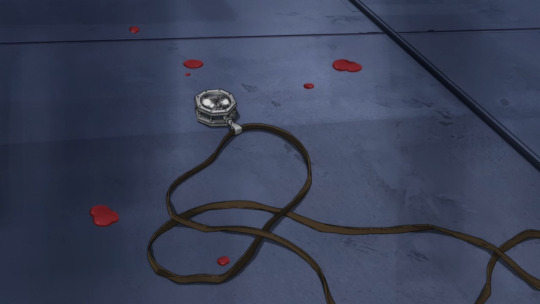
I'm curious. What do you guys think of Riddhe's lucky charm as a piece of symbolism? Does it add anything for you? They put an incredible amount of effort into visually highlighting it. Obviously, he drops it during his final scene in this episode to represent some kind of significant change or loss. Aside from the charm being an anime-only addition, I think what throws me is that novel Riddhe had already lost all the things the charm would logically represent before this point. He already underwent his most significant emotional and ideological changes. "That Riddhe Marcenas is dead." It's why he can't make peace with Banagher, and it's why Mineva rejects him.
That's what novel Riddhe loses at Torrington: his two most important remaining relationships. I definitely don't think that's what the charm is meant to symbolize in the anime.
Since it's a charm for luck, I'm assuming it represents caring about his own well-being. That makes sense to me, when dropping it is being associated with choosing to pilot the Banshee. "Riddhi" is also a real name and word that means "prosperity" or "good fortune", which meshes well with that interpretation.
I'm assuming this means he's going to finally develop novel Riddhe's trait of deranged latent suicidality going forward. Beyond that, I'm not sure what to make of it— though I did like how it was used in "Return of the Lion".
Marida in the Banshee
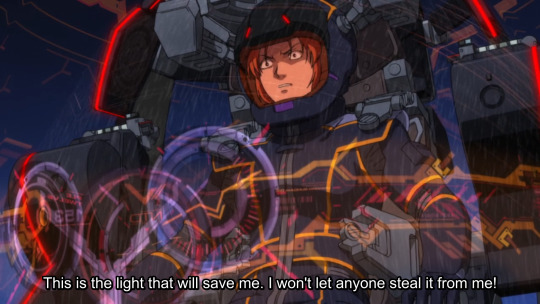
The motion sensor showed a matching signal, and the word “RAS-96” appeared on the screen. That’s called the “Anksha”, right? Name and model number, Marida and Ple Twelve. ... What is a name? What significance does it bear? It’ll simply cause confusion to call the same thing two different names. [...] I just don’t have to think. I can continue to fight as long as I don’t think.
There are things I could criticize about Marida's portrayal in the novel— we'll get to that— but I still found the anime version of this arc to be the less compelling version of the two.
I think there are three key issues here.
I've mentioned before that the environment mirrors the conflict between characters. The combat in the anime version is more static and less visceral, failing to match the heightened emotions the characters are feeling.
Characters in Unicorn are very densely interconnected, and minor details are often carrying more emotional weight than it might appear. If something had to get cut, Alberto's scenes were a rational choice— but removing them also means removing meaningful character moments for Marida.
Marida's history of sexual abuse was weaponized as part of her brainwashing, so it is referenced often during this part of the original text. In the anime, this is elided.
I'm sure it's difficult to thread the needle regarding that last point, and I sympathize. I mentioned in my last post that I think Fukui's writing could probably benefit from an editor willing to rein him in, and the handling of Marida is one of the areas I cited. The anime reined him in— but in this case, I find myself wishing they left more of the original. Ah, well.
I don't think there's a perfect solution here. I'm not sure there's even a more correct decision. All I can do is explain my own feelings about each work.
I wish Banshee pilot Marida was scarier.
Novel Marida sees significantly more extensive— and effective— use as Martha and Alberto's weapon. While her kills are all minor players in the narrative, at least one of them is a named perspective character with an important role in Neo Zeon's offensive.
Unfortunately, moving Torrington unavoidably defanged her a little as a threat. Since she didn't fight in the battle, she never had the chance to engage with anyone other than Banagher and Riddhe, and they both came out of it alive and physically sound.
They also cut the moment during her rampage where Marida causes the gruesome (accidental?) death of novel-only character Bentner, the head Cyber-Newtype researcher from Augusta. As someone who directly contributed to Marida's suffering, his death is poetic, even if it wasn't a choice she made with intention.
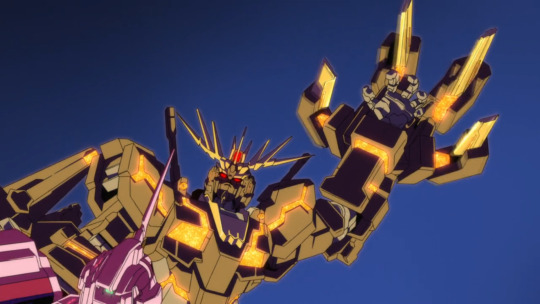
I'm a fan of this claw weapon. It gives the Banshee something that makes it more than just a visual Unicorn redesign, and it's appropriate for the lion theming. It's new for the anime, so I appreciate the addition.
I'm glad they kept the detail of the robots "screaming," and I dig the Banshee's new unique loadout, but the fight on the Garuda left me really underwhelmed. It was so cool in the book, man. There has to be more they could have done.
If you're specifically invoking the Axis Shock, I want it to look crazy. A colour overlay on the robots absolutely does not cut it. Have the surface of the Garuda that they're standing on start peeling! Get some real psychic miasma going! Make it so I can't even tell the sky is blue when the camera pulls in close. Something.
Am I being unreasonable here? Is this an unfair expectation?
I'm aware of the difference between drawing an illustration and doing the same thing in animation, but maybe this gives you an idea of the kind of imagery I had in my head going in:
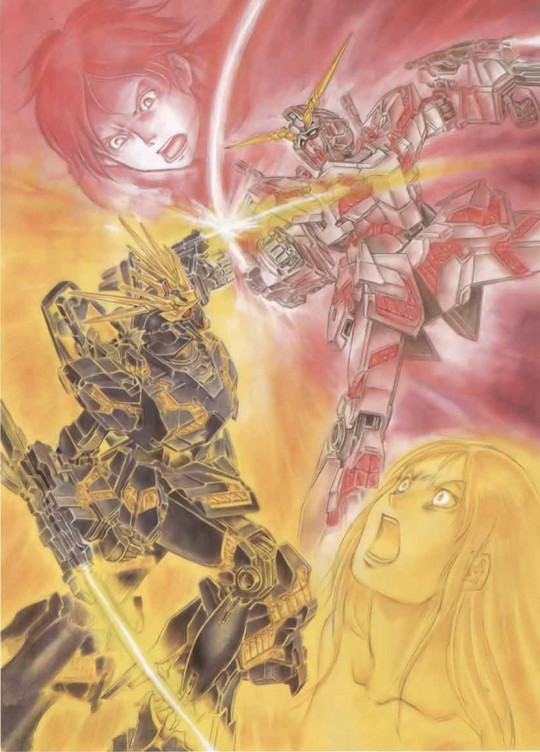
LOOK HOW SICK THIS IS.
Another thing about the novel's Banshee-Unicorn fight is that Zinnerman boards the Garuda while it's happening. He's literally an exposed human figure dangling on a wire while these metal giants are stomping around and swinging superheated beams at each other. Then the wire snaps, so Banagher has to catch him and cradle him to the Unicorn's chest while the Banshee attacks!
Zinnerman shoots the Banshee with a rocket launcher at one point. I swear to god, so much shit happens.
Marida tearing into the Delta Plus had more of the aggressive vibe I wanted, and it was definitely my favourite visual in the whole fight. The scene they placed it in, unfortunately, is still significantly less dramatic than the original scene that inspired it.
The anime version of the Garuda's hangar bay is essentially a big, empty arena for the mobile suits to fight in. In the novel, there's a ton of shit in there, and people are still present. Several small work vehicles explode, so the whole deck gets set on fire. There's human gore, because Marida unintentionally crushes Bentner with the Banshee's hand. It's a nightmarish scene, especially for someone like Zinnerman who isn't in a mobile suit.
Excerpt, for comparison:
The entire hatch was blown off, and [the air inside the plane was sucked out through a huge gash where the deck caved in]. The [wind roared in Zinnerman's ears] as he heard the frantic voices of the crew, “Retreat to the deck!” “We might have to evacuate everyone here. Get everyone to the escape pods!” He [could barely] distinguish the yells ...
[...]
He turned his [head sharply] and saw the black “Unicorn” with the thruster lights on its back, followed by the white frame of the “Unicorn Gundam” closing in on it. Both “Gundams” proceeded back and forth within the deck, [knocking down the hangar and releasing hot air from their verniers]. Zinnerman saw the black [“Unicorn's” hand fall, crushing an] old man in [a white coat.] Blood and flesh was splattered everywhere immediately, but [it was drowned out by] the impact and [sound] of ... these several ton machines [colliding, followed by] a hot wind [that blocked all vision] as it blew above his head. The workcar got knocked into the air, crashing right into the compressed gas cylinders, creating an explosion of flames. The energy of the explosion created a quake, causing Zinnerman, who was sprawled on the floor to feel a rumbling, and he lifted his head only when the heat wave passed by. Alberto had disappeared, and the two “Gundams” were in front of him, stepping on the floor and trying to get up. The black “Gundam” was lit by the flames, [making the likness of] the “Unicorn Gundam” it [opposed] in this mirage, and the [golden glow of the] Psycoframe [flickered] like it was breathing. [The heat of the beam saber erupting from the machine's sleeve made] the [catwalk railings] melt and bend like malt candy. “MARIDA!” Zinnerman covered his face as his skin was being burnt, but the black “Unicorn Gundam” did not care about what was below it as it continued to backtrack and knock over the work vehicles.
Like. Holy shit.
Sexual violence, gender, and "the light"
(Content warnings for this section: rape, csa, pregnancy and pregnancy loss, forced medical procedures, incest. I'm not getting graphic about it, but this is the primary subject of this section.)
I had a fairly negative opinion of how the sexual violence was handled in book 7 the first time around. It has the disadvantage of coming directly on the heels of book 6, which is the one that really pissed me off, so I wasn't feeling particularly charitable.
My feelings are more positive this time, now that I'm rereading with the context of the whole work. Paying more deliberate attention to Alberto and Martha has also paid off in that regard.
The screenshot I chose at the top of Marida's section has a very particular bit of dialogue in the subtitle:
"This is the light that will save me. I won't let anyone steal it from me!"
While it still makes sense with the overall imagery used in Unicorn— it calls back to the church scene, where Marida talks about how people need a light to keep living— they otherwise removed all references to "the light" from this episode.
"The light" refers to a lot of different ideas, but the way it's invoked by Marida in this arc specifically represents both a general desire to erase the violence that was done to her, and a more specific longing for a child.
I am instinctively predisposed to roll my eyes at "infertile female character with a strong secret driving motivation centred around the ability to become pregnant," especially when it's written by a cis male author, double especially when the story also involves a child conceived by rape.
While Marida is fixating on her past, Martha is constantly talking about wombs. We also just had Loni in book 6, who told us she wants to have ten kids. If you're already reading with a pessimistic outlook, it's easy to start feeling like every major female character except Mineva has suddenly had their characterization re-centred around how they relate to motherhood.
I'm sure that Fukui probably has different opinions about gender than I do, but I've ultimately warmed up a lot to these elements of Marida's story. It's more thoughtful than I was originally willing to trust it to be.
It helps that the repetition is very much not unique to female characters and motherhood. Marida strongly mirrors Banagher, Alberto, Angelo, and Full Frontal. When the paralellism is so consistent across the board, it becomes clear that the similarities between female characters are more than just the narrative assuming all women have the same basic neuroses and drives.
Marida is also brainwashed, obviously. Her priorities have been artificially altered, even if they contain traces of her genuine thoughts and emotions.
Moreover, her reconditioning was explicitly based on Martha. The similarity isn't just intentional on a meta level as a storytelling device, it was intentionally cultivated in-universe.
"Light" as a theme for Marida first appears during the church scene in volume 4. It's usage is roughly analagous to Banagher's "Inner God." It comes up again in that same book, during Marida's backstory flashback.
Light is a repeated visual element that connects every scene we see from her past. It's very much not presented as something with purely positive associations. In these brief moments, light is frequently something sinister.
Light is the first thing Marida sees when she wakes up for the first time, shining behind the silhouette of Glemy. Light is the explosive deaths of her sisters. Light is the neon signs of the red light district, and light is the surgical lamp of the abortionist. Light is her baby, already gone by the time she understands what it was.
Light is the open doorway when Zinnerman comes to take her away. Light is a reason to live. Light is the desire for purification by death, and the glow of a beam rifle shot that never comes.
However, the girl could recognize this warmth. A long time ago, a hand reached out to her from the water surface. The warmth of the human hand she touched when she was pulled out from the capsule was about the same as [this hand.] The girl focused all her consciousness on the thick and hard hand of the man. Warmth flowed out from there, and as she felt the cells within her shaking, the girl looked up at the man’s eyes. The [damp eyes] reflected her black and dirty face. Who are you? The girl tried to ask. I’m me. The her present in the eyes answered. You’re not the 12th sister, but a one and only existence granted the name of Marida Cruz. You have a real master, so you must live for master. Don’t live on because you’re created this way, but give your all to serve your master. This warmth is the real ‘light’, the one and only ‘light’ that reached into this darkness. Don’t let go of this ‘light’. Go do what master hopes for you to do, fight master’s enemies until this body of yours get burned one day, and all your sins and guilt return to nothingness— Marida’s thoughts were calling out within Zinnerman’s eyes. That’s just a curse on yourself! Banagher’s thoughts interrupted at this point. That’s just a curse you set on yourself. The Captain doesn’t want you to do that in the first place. I know. You’re right. But I said it before, didn’t I? Righteousness might not be the only thing that can save humanity… Marida’s retorting thoughts merged into the light, surrounding the girl that was standing blankly in the underground room. The white light covered the entire room [...] and Banagher saw the light transform into heat as it evaporated the tears. Light. A purifying light that burned all sins and guilt—
[...]
Since where is there this kind of redemption? Banagher yelled in his thoughts with all he hand as he tried to make the rioting machine stop. I understand you, whether dream-wise or illusion-wise. When our thoughts overlapped and resonance in that sensation, I saw your existence. Humans can understand each other—and that is the real ‘light’. What you want to redeem you is to reveal the possibility that’s dormant and release the inner god within you. However, you only looked at your past—
Basically, "the light" is introduced as the thread that connects all of Marida's suffering and hopes, and connects her to others. The way it's used while she's brainwashed is a departure, redefining it to represent only a small part of her past.
Consider that two extremely important associations that Marida had with light— Zinnerman and Banagher— have been deliberately removed from her memories. The shift in meaning makes sense.
But the thread is still there. The belief that "the Gundam stole my light" doesn't really make sense if we're only talking about her baby, does it? It only makes sense when we see the totality of her suffering: the loss of her child is the same as the sexual abuse that created it in the first place, which is the same as the death of her sisters.
Marida has never belonged to herself, but now the few things that made the world make sense have been taken away. Something is missing, and she wants it back.
(…The “Gundam”, is the enemy.) The armor on the machine expanded, and the huddled black shadow expanded. “Miss Marida…!?” The “Banshee” did not respond to Banagher’s call as it lifted its head that was looking down, and the exposed Psycoframe started to radiate a golden glow. (You’re the enemy that killed us. You’re the enemy that robbed the “light” from within me. You, you’re the “Gundam”…!)
Character parallels: sexual violence, non-consensual medical procedures, and textual comparisons thereof
I could write an entire essay just on this theme in Unicorn. Maybe I will, eventually.
I'm going to try to avoid getting too in depth for now, since there's a ton of relevant information that only comes up in later books. Still, I want to at least go over some general points.
There are many places in the text where the comparison is drawn, both implicitly and explicitly, between sexual abuse and other non-sexual violations of the body and mind— particularly in medical or experimental contexts. Marida is the point where this comparison is made at its clearest, because she has experienced both.
The sexual abuse, the forced abortion, the reconditioning, even her original creation as a Cyber-Newtype clone— these are all framed as similar kinds of violations.
Not every character has the framework to understand how these experiences are related, but Marida makes the connection instinctively, sometimes even collapsing them together in her thoughts as if they were a singular continuous event.
Is she wrong? They're even related on a causal level: the abortion happened as a direct result of the sexual abuse, and it was performed to allow it to continue. The reconditioning deliberately drew on memories of sexual abuse to alter her behaviour, and the woman who ordered it was herself a sexual abuser of children.
Martha is another obvious demonstration of the comparison: she's the point of overlap between both categories of perpetrator. Her sexual abuse of Alberto and her brainwashing of Marida function similarly, and both serve the same purpose of controlling the victim.
It's unclear exactly how much Alberto knows about Marida's past, but it's not a huge leap to assume he sees himself in her. If he isn't consciously recognizing her as another csa victim— or realizing the similarity between that experience and Cyber-Newtype conditioning— he at least understands that they are both Martha's puppets. The tragedy is his inability to admit that as long as he continues acting as Marida's "Master" he is actively complicit in harming her, not merely a witness.
I want to talk about Angelo and Frontal here so badly, but it's probably best that I hold off until at least the next episode. For now, I'll just say that Angelo is the most blatant Marida paralell in the whole series, and he has his own symbolic fixation akin to Marida's "light."
Gundam is the enemy
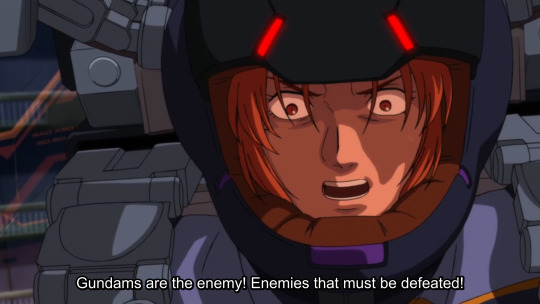
In the original work, the moment where Marida processes that the Banshee is a Gundam and concludes that she is herself "the enemy" does not involve Riddhe. She already shot him down earlier, so he isn't even on the Garuda at all anymore. Instead, the realization happens when she mistakes the Banshee's shadow on the wall for the Unicorn.
I guess they swapped the shadow for Riddhe because... there just isn't fire in the hangar to cast a strong shadow. But why? Why not put a fire in the hangar? Many inexplicable choices in this one.
Marida isn't just breaking the logic of her brainwashing by realizing a fact about the robot. When she makes this connection, she's also forced to acknowledge feelings of self-blame and guilt that she had been repressing. That's the sentiment that ultimately causes her to collapse: I failed to protect my master. I broke formation rather than dying with my sisters. I was too weak to protect myself, and too weak to protect my child. The person I want to punish and destroy is me.
She let go of the control sticks and touched her face with her hands. The flames lit the “Banshee” and the shadow of the “Gundam” was reflected on the wall. This means that I’m on a “Gundam” too? I’m inside the enemy, and the enemy’s inside me? The enemy that killed my sisters, robbed me of my ‘light’, and continues to remain in it no matter how I tried to chase it or catch it? I’m my own, enemy— A snake was wriggling inside her mind, causing the seeds of pain to erupt. Her body and mind were breaking apart. [The] ideals that were once connected to her heart were severed [and] the flesh and blood [flowing through] the machine [gradually converged into the helpless] body. I’m my own enemy. The one I hated [and] wanted to kill is [myself, the person] who can’t protect my own ‘light’.
(Mineva actually calls this very early. In one of her scenes with Martha, she thinks to herself that Marida is not actually being animated by revenge on others like Martha believes.)
Here's how the encounter concludes:
Marida falls out of the cockpit. Notably, she is still conscious. Her inner monologue immediately identifies Zinnerman as her father when he reaches out to her; it's very sweet.
Alberto is still in the hangar. He panics, and tries to tell Marida to get back in the cockpit again. She doesn't recognize his voice.
One of the Anksha mobile suits from the battle outside flies into the hangar through the open hatch. It takes aim at the Unicorn, and Marida immediately realizes Zinnerman is in danger and will not be able to get out of the way. She calls out to the Banshee and wills it to move, and it does— it raises its Beam Magnum and fires.
The Anksha is hit by the Beam Magnum and explodes. The shot it fires goes wide, hitting the side of the Banshee. Marida is thrown by the force of the blast, and burnt by the wave of heat.
Banagher gets out of the Unicorn and helps Zinnerman and Marida into the cockpit. They're both a mess. Zinnerman is covered in ash, furious and crying with bloodshot eyes. He tells Banagher not to waste time— "I won't forgive you if your blunder ends up killing her."
When they're about to leave, Alberto stumbles over to the Unicorn in a daze. Banagher is shocked, having assumed that he had already left on the shuttle. He re-opens the cockpit and tells Alberto to get in.
Shaken from his daze, Alberto is infuriated by this offer. He pulls out his gun and fires at Banagher until he is forced to close the cockpit and leave.
Alberto goes down with the ship.
The Fate of the Garuda: Who Goes Where?
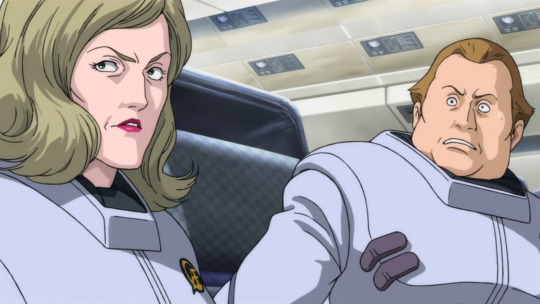
In the OVA, we see Martha and Alberto leave on a little aircraft shuttle together, directly from the Garuda.
The Banshee is still on the Garuda, where it is found by Riddhe after he regains consciousness. Mineva, Zinnerman, and Marida all make it back to the Garancieres, which is successfully picked up by the Argama.
The General Revil shows up at the end, as well as Full Frontal and Angelo. Banagher is still in the Unicorn.
In the novel, Alberto and Martha are separated. Martha boards the shuttle, but Alberto stays, because he's worried about Marida.
Banagher offers Alberto a ride in the Unicorn, but this enrages him, and he shoots at Banagher with his handgun until he retreats into the cockpit and leaves.
The Garuda crashes, with the Banshee and Alberto still on it.
Riddhe was shot out of the sky by Marida, after which he fell unconscious. When he wakes up, he retrieves the Banshee and Alberto from the wreck of the Garuda.
Zinnerman and Marida are not able to be brought back to the Garancieres in time, so they are still in the cockpit of the Unicorn when Banagher connects the tether.
The Garancieres and the Nahel Argama escape successfully and are not immediately pursued. Angelo and Frontal show up several days later, at the start of the eighth book.
So, there are quite a few differences, but I think Alberto's scenes are the most obviously significant that I haven't already discussed. I've mentioned this a few times in previous sections, but Alberto is a different type of character in the novels than he is in the anime. The novel takes him significantly more seriously and gives him a larger role, while the anime has kept him within the realm of comic relief.
I'm going to include a bunch of excerpts here, sorry. I think they're more illustrative than just me summarizing or listing character traits. I've tried to shorten them and fix the worst of the grammar.
Alberto with Zinnerman, refusing to leave on the shuttle:
“She’s no long a member of Neo Zeon. Give up and leave this place. The “Garuda” won’t last for long.” This person is Marida’s current master. Is his name Alberto? the blood surged up Zinnerman’s head as he growled, “What nonsense are you [spouting?]” ... “You’re the one who should scram. I’ll take Marida back. She’s not the tool you people think she is.” The gun held in both hands trembled even more. This [guy] isn’t used to [this kind of] situation. Zinnerman understood that it was not wise to agitate the other man, but he still finished his words. [However, he was taken aback by Alberto's agitated reply—] “I KNOW THAT!” “SHE’S NOT A TOOL! SHE’S…” Alberto was at a loss of words. [His lips twisted, and a bitter expression appeared] on his face. What’s going on? Zinnerman frowned for a moment, [then heard a yell—] “Master Alberto! Hurry! The shuttle’s leaving!” [— as an old man in white clothing] appeared from the side, [completely covered] in ash. “Oi, someone’s calling you.” Zinnerman pointed his chin, and Alberto glared back at him as he exerted more strength into his hands holding the handgun. ...
Alberto witnessing the Unicorn vs. Banshee fight and finding Bentner's horrible crushed corpse. Again he refuses to abandon Marida, even when Martha directly contacts him and tells him they're leaving:
... [The] flying high-heat particles [were] scattered [and rained down] as [a] powder of light. [They] landed between Alberto’s [thighs] and [made a sound as they melted into the floor], [and he scrambled] back [in fear]. As [his hand reached behind him, it] touched another person’s arm, and he gasped as he turned around. The [arm, wrapped in the sleeve of a torn labcoat, clearly] belonged to Bentner, but [there was no proof.] [Just like the white coat,] there was no body beyond the [severed] shoulder, [only a pool of blood like splattered red paint] ... The scattered particles of the beams dropped into the [pool], and [white steam rose from the mixture of blood and solid matter]. The smell of cooked meat entered his nose, and [all Alberto could do was] remain seated, [unable to feel anything]. [...] (What are you doing, Alberto!?) It was only [upon hearing Martha's hysterical yell] that he finally thought of bringing the wireless communicator to his ears. (We’re leaving. Forget about [the] specimen. We just need to find a replacement, whether it’s the machine or the pilot.) Alberto’s numb senses were jolted awake by this voice, and he looked down at the communicator in his hands. She doesn’t understand. Aunt [Martha] doesn’t understand, and she has no intention of understanding—no, maybe to her, everyone else is just something that can be replaced ... (There’s no time. Hurry—) Alberto ignored Martha’s call as he switched the frequency of the communicator. “Ple Twelve, it’s me, your Master. Do you hear me?” [...] “There’s no need to reclaim the machine ... Wreck the “Unicorn”. Hurry up and beat that guy and escape me with. You and I are the only ones left here.”
Alberto thinking about Cardeas, Banagher, and his childhood. Very brief / vague mention of incest:
“If it’s you, you’ll definitely be able to beat the “Unicorn”. This guy’s the cause of everything. As long as you destroy it, the path leading to the “Box” will remain sealed, and aunt will only give up. Even my father…” Can only give up, right? Alberto could not help but ask himself, and shut his mouth as he answered himself. Wrong, that man will never stop. [In this kind of situation,] Cardeas Vist [would simply take a proactive approach and plan his next move]. [Using his own strength as the standard], [he determined] that [the weak] were simply [lazy]. That willful foolish man ignored his own son and left the “Unicorn” to the [child of his mistress]. Why did things end up like this? Who let the gears spin out of control first? [...] He recalled the expression his father had when he died, that look of despair and pity ... [and] the [sudden rush of] emotions [dampened] his vision. No, I’m not the one at fault here. It’s his fault. ... Banagher Links took [my] dad away, and even took the machine he built, [without] even [realizing] that he [had stolen anything] at all. That guy [is the reason everything was] thrown [into chaos]. Just looking at [him] makes me anxious. [...] I feel inferior, like I’m being taunted for being useless. It [would be] good if he [had never been born]. If I could be as strong as him, I [wouldn't] have [had] a complete breakdown in relation with dad, I [wouldn't have ended up in] an abnormal relationship with [my] aunt, and I [couldn't have] possibly [harmed] dad— Tears swelled in his eyes and slid down his cheeks; he wiped them away and brought the communicator to his mouth.
...
I won’t let you take anything else away from me. Marida will beat you. This [unique] life that’s strong-willed [and] gentle, [who feels ephemeral and fragile like my mother,] [she'll] defeat you and settle all our debts. I don’t need aunt [Martha], and I don’t need dad. I��ll just wait here, until ... the “Banshee” [slices] you apart and [chases] away the [inescapable darkness.]
Mother comparison. Of course.
I'll skip Alberto rejecting Banagher's offer of help, since I already described it.
That brings us to the final scene of the novel, where Alberto wakes up in the cockpit of the Delta Plus with Riddhe. Interesting that it can still fly despite falling out of the sky earlier— maybe the shot Marida fired knocked him unconscious immediately, or it can only stay airborne in waverider mode?
This ending makes me lose my fucking mind every time I read it. Riddhe saves Alberto's life and then they literally fly off into the sunset while Alberto thinks about how much they have in common.
Alberto opened his eyes. The light in reality was too sharp, and he closed his eyes before opening them slowly again. What he saw first was the sea surface from the sky. [...] Is this some mobile suit cockpit? he touched the curved monitor panel at his feet and intended to look up at the linear seat beside him, but at this moment, a shadow appeared in a corner of the all-view monitor, and his heart jolted, beating his chest. There was a mobile suit riding on the “Anksha,” ... gliding diagonally below ... He realized that it was the “Banshee”, ... Alberto looked down at the machine lit by the [light reflecting off] the sea, and [he] thought of the name Marida, [when a voice rang out from just beside him.] “We can’t seem to find the pilot.” ... [Alberto] lifted his [gaze] and looked [back] at the linear seat to find Riddhe [Marcenas] there. Riddhe looked at him for a moment, before turning his somewhat forsaken expression forward as he activated the display board. He opened the expanded window to show the “Banshee” [up close] as it laid down on the disc, but Alberto’s face remained unmoved. How did things end up like this? Why is this guy—no, where is this place? Alberto could not clear the doubts rising [in] his heart [as] he [stared at Riddhe's face]. ... Riddhe turned around in an annoyed manner [and] removed his helmet, [running his hand through his blond hair.] “Since you’re awake, pull out the assistance chair yourself,” [he said curtly.] “I’m already out of breath [just from pulling] your unconscious [body] on board. You’re an Anaheim employee, so you should know the [layout] of a mobile suit, right?” ... Alberto looked around the inner wall of the cockpit again. Since he could see the sea surface, it meant that this mobile suit was not on a Base Jabber, which meant that it could fly in atmosphere on its own. This means that I’m on Riddhe’s machine, the transformable “Delta Plus” in its wave rider form? Upon realizing this, Alberto calmed down slightly as he exhaled. He searched his tattered clothes, [confirmed] that he had no [real] injuries, and turned towards Riddhe again. “Why did you save me?” he asked... [Riddhe didn't even make eye contact.] “That’s [just] how things are going now,” He answered with a sigh. “I [passed out] after I was shot down by the “Banshee”. By the time I woke up and got back to the sinking “Garuda”, you and the empty “Banshee” were the only ones [left.]” Riddhe looked over at the “Banshee”, lifeless like a puppet as it laid on the “Anksha”, and narrowed his eyes. “The “Unicorn” has vanished.” And Mineva too… some heartfelt words could be heard right after this mutter, and Alberto did not intend to ask further [...] His love affair may have ended, this understanding landed upon the cavity in Alberto’s chest and created ripples in his hollow body. Both of them were descendants of those cursed by [“Laplace's Box”,] and both [had] lost their fleeting love—[with skepticism, a sense of loss, and a touch of empathy,] the “Delta Plus” [flew] through the [twilight] sky. [Unsure of] where they were going or where they should go, [Alberto] looked [out] at the [amber-coloured] sky and sea. The “Anksha”, ferrying the unmanned “Banshee”, turned with the sea surface behind it as it pivoted its way through the crimson sky, [leaving behind] an empty trail of jet cloud.
Alberto/Riddhe real...?
The Escape: RGB Gamer Mode
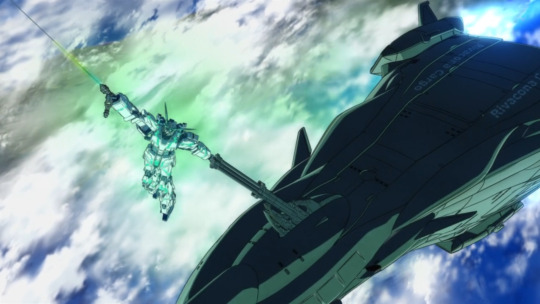

The original text description of this phenomenon is a little more blatantly rainbow and less dominated by green, but these visuals are still very pretty.
The ghosts of Daguza and Gilboa do not appear during this scene in the novel. I think they're a sensible addition. It foreshadows exposition about "lingering thoughts" that we should be getting next time.
The biggest change here is that in the novel, Marida and Zinnerman are still in the cockpit with Banagher. There was no time for them to be transferred to the Garancieres while shaking off their pursuers. The trigger for Banagher's renewed determination, the Unicorn's strange glow, and the resulting miracle is Marida regaining consciousness for a moment and taking his hand.
I would have really liked to keep that... I think it's a strong way to end a conflict that had Marida as such a central figure, and the imagery ties directly into her fixation on "the light". Marida does have an inner light, and none of the terrible things that were done to her can ever take it away.
The General Revil: What????
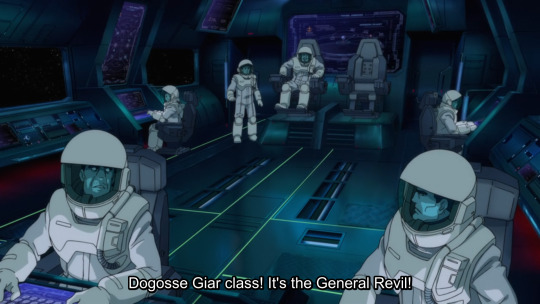
They introduced the General Revil this episode, when Bright talked to Beltorchika. I was still incredibly taken aback when it showed up at the end. Especially since it immediately engaged in combat? This was very much not what happened in the original.
Bemused as I've been about it, it's easy enough to figure out why this was done. Again, they're cutting things for time, by making the path between locations and plot points more direct. I just really wasn't expecting it!
In the novel, the crew of the Garancieres and the Nahel Argama get away successfully, and it takes some time before anyone catches on to where they actually went. I'll probably get more into the details of all that next time, since it's the start of book 8.
I will say that the Federation ship that Angelo and Frontal attack like this in the novel gets destroyed. Surely they're not going to sink the General Revil... ???
Speaking of which,
THE BOYS ARE BACK IN TOWN

Do you have any idea how happy I am to have an excuse to put pictures of Frontal and Angelo in one of these again? Do you?

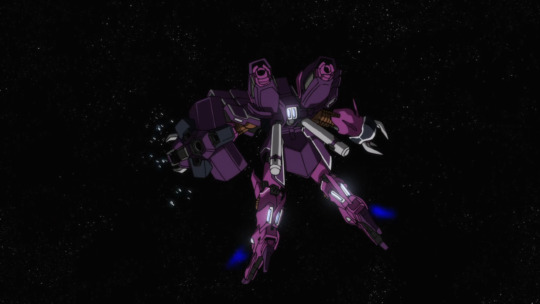
The Rozen Zulu is one of my favourite mobile suits. Stiletto heels, big metal claws, INCOMs, and character-focused visual theming? She has it all.
This is exactly the problem: this part was the coolest robot stuff in the whole thing to me. An exciting hook is never a bad thing, but I think the coolest robot moments should always try to be the ones at the emotional core of the episode.
Yes, I know I get excited every time Angelo and Frontal show up. I can distinguish that from this. Did you see those ReZELs get melted? Did you see Frontal's totally unnecessary bazooka twirl? So good.

I'm glad he's having fun. :)
So that's the end. It looks like we have quite an exciting setup for next time— which may or may not be a bit of a fakeout, depending on whether they're keeping or skipping certain scenes.
I'm not even going to try to make predictions at this point.
Haro, play Broken Mirror by Boom Boom Satellites.
21 notes
·
View notes
Note
if you want the good ones its really. original -> zeta -> zz -> char's counterattack. and then all the uc ova's (war in the pocket, stardust, 08th mobile suit team). this isnt something you can do though because i want to watch you liveblog victory so please go and watch f91 and victory after that please. AND turnA as well
you didn't get my joke but I appreciate the list
so far of Gundam I've watched the first ep of Witch from Mercury, then I watched all of 0079 while that first season aired, then Zeta as the second season aired, then ZZ and IBO until I finished the latter and am a few episodes from the former. after that, I'll take a break from Gundam and watch Votoms or something and then come back to Wing and F91 I guess?
23 notes
·
View notes
Note
I'm a casual mecha anime fan who hasn't really had a chance to get into the genre. What mecha series would you recommend, preferably things that I might not have been exposed to already? I can put up with bad stuff too as long as it's entertaining
a couple rambling recommendations below the break
Getter Robo. Getter Robo is so incredibly good. it's stupid and violent and gloriously over-the-top. I highly recommend experiencing it before watching series that take a lot of influence, like Gurren Lagann, just so you can fully appreciate the homage (also, watch Gurren Lagann)
IBO gets a lot of hate as an entrypoint into the franchise because, being completely honest, its fans can be absolutely insufferable and refuse to engage with the rest of gundam. that said, I really really enjoy Iron Blooded Orphans and have to recommend it
if you want a slightly more respectable entrypoint (by broad consensus) you can also check out the original Gundam series and War in the Pocket. you might have already watched those though? who knows.
The Five Star Stories is wonderful, but it only got an OVA adaptation and is otherwise manga exclusive. if you're fine with reading, I highly recommend it. FSS is approximately 75% infodumping, so the OVA misses out on enough to where I wouldn't even consider it a spoiler for the chapters it covers
Aura Battler Dunbine is like a broad-spectrum test for how much stupid kino you can handle. if you like giant bugs and mecha in a fantasy setting, you've gotta check it out
here comes a recommendation with big caveats: Bokurano is a beautiful series about the despair of inescapable death and how the terminal are forced to come to terms with walking into its arms. it feels weird to include it in a list of mecha recommendations on a level that it doesn't feel weird to recommend...
Neon Genesis Evangelion! you've probably watched this one. I don't know. maybe you haven't. you should probably watch it, either way
I'll probably think of more series as soon as I send this answer, such is the peril of trying to remember anime series off the top of your head. this is a pretty good quick list of recommendations, though, I think
63 notes
·
View notes
Note
If you wanna get into Gundam I highly recommend checking out the Gundam the Origin manga. It's a recent-ish manga adaptation of the original anime, drawn by the character designer of the original series. The art is beautiful and all in color, and it adds a very lengthy flashback/backstory sequence partway through the manga. (I have some issues with this part but overall I think it's a great addition that does a lot to flesh out the characters and world.) The original show/movie trilogy are classics but I think this manga is a much more approachable entry point for modern audiences and it's my personal favorite version of the story. (there is an anime adaptation of The Origin, BUT it only adapys the flashback/backstory part of the story that the manga added) Alternatively if you want something short and sweet. War in the Pocket is an excellent 6 episode OVA. It stands out from the rest of Gundam because it's one of the only ones where the main character ISN'T a mecha pilot. It's about a young boy who gets involved in a secret military operation/conflict. It's gorgeously animated, emotional, brutal, and it doesn't really require any prior knowledge of Gundam.
thaaaaaank yoooouuuu ❤
this was exactly what i needed, and now ive started reading the origin manga + added war in the pocket to my watch list
origin looks so good, im so excited to get into it!!
#asks#3starjammies#sorry for leaving you hanging in my inbox for so long btw#ive had a few busy days and knew if i started reading the manga i couldve lost track of it all orz#but really a huge huge thank you for making me finally start gundam ive been thinking about it for YEARS
3 notes
·
View notes
Text
The final Origins OVA!

we are WAR!!!!

okay why in the world did they make a giant space axe??? like???

and just for the ONE guy too?????? did he request it????
yknow what i bet he's gonna do like a cool robot beheading or something with it later and that's the whole reason they put it in the show huh.

I forgot this is the first like- actual big battle where they're employing the mobile suits.

It's interesting to see the contrast between them and the like fighter jets, which is what they would've been effectively replacing.: A small quick maneuverable ship with guns, but this one can also just kick you

War (TM)

oh he really does look like a red comet out there huh

love when she dresses like an actual supervillain

LITERALLY ON THE RED CARPET
WILD

i like how Char was surrounded by fangirls who all backed off the SECOND Garma showed up
also they sure do love lingering scenes of these two staring into eachother's eyes- wonder what that could mean :3c

wait why are we reviewing art now. Whoms't is this man.

okay hold on now there is NO reason to make a paper shredder be a guy

hello?????????? literally just walking into an enemy ship like???????? what is the plan here??????????? worst strategist ever?????? the second you got on board your gunship can no longer threaten to destroy them because they have a hostage now??????? like your enemy is free to just grab you and fire on your ship at will????????????????????????????

oh right nvm i forgot this is Char he's got plot armor

y'know Kai feels like a completely different character in Origin. In the original series he was kind of a little shit but not a BULLY- self centered if anything, but otherwise morally neutral. In Origin though he's like proactively being malicious?

sir.... you can't just walk up to the military and ask them about military secrets....

WHY EVERYONE MEAN TO HARO

STOP IT!!!!! STOP KICKING HIM!!!!!!!!!!!!!!!!!

literally a MIRACLE they did not throw you in prison

:^(

lol they fukin robbed u dude
fucked up your whole house

I think I missed out on the plot points where this political twist was explained/set up - I do not rember who this man is, nor do I fully understand why he is saying these things or the full Implications
Like uh, my (probably incorrect) understanding is: he's an important general(?) from the non-zeon army, but was held hostage by zeon, and then freed as part of Kcyllia's(?) plan(?) I totally missed what her plan was tho: is it just to keep the war going????? I'm p sure mr oldie wasn't briefed and is just a pawn in their weird 5 dimensional chess game the Zabi family is playing .
(this is what happens when you do your neopets dailies instead of paying attention when characters start to ramble)

this is like the 3rd time a character has said "humans looooove war" this episode.

ITS WEIRD TO SEE THESE FUCKERS ACTUALLY SHAPED LIKE PEOPLE INSTEAD OF WEIRD EGG BEINGS

weird 2 me how he can close he eyes without closing he eyes

and I guess it ends on "btw we will NOT stop a war!!"

oh wait no we also get a post-credit peek of the boat!!

actually it is ending i think...
(they never did anything with that giant space axe from the beginning for the ep...........)
-
Final thoughts on Gundam: The Origin
I think I went into Origin without any real expectations. I maybe thought it would be entirely Char focused? but in the latter half it shifted to a more general "what's goin on with this war" type vibe. I guess it accomplishes what it sets out to do: give us more backstory on how the war from 0079, fleshing out the the politics around it and the characters who partake. There were some wild things happening but mostly it was a lotttt of people talking about War. Felt kind of like a lorebook rather than an actual story, especially for the latter half, but that's not necessarily a bad thing.
Up Next!* MS Team, Thunderbolt, and War in the Pocket (side stories that took place during the events of 0079) Looks like Thunderbolt is a movie but the other two are series so this is going to be infinitely easier to schedule time to sit down and watch.
*I'm following a watch order rec from reddit, which seems to be more or less chronological order
#eyfeys gundam journey#Origin done!#v excited to go see some 90s gundam next#Gundam with 2015 animation was somehow unsettling
5 notes
·
View notes
Text
The Big Gundam Watch, Part 15: Mobile Suit Gundam: The 08th MS Team
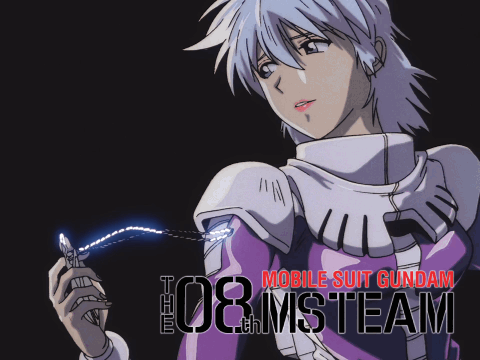
In my War in the Pocket post, I noted that it and The 08th MS Team make up what are considered to be The Good OVAs. Which, if you haven't read that post, doesn't mean that they're the only good Gundam OVAs, but they're the ones some people like to point to when recommending an entry point to the franchise. This is due to their consistently high production values, relatively short length, and stories that are more "grounded and realistic" than most of the other TV shows, OVAs, and movies in the franchise (which I have since learned is code for "No Newtype Bullshit", rather than implying anything about the believability of the giant robots). The 08th MS Team even sounds like a good compliment to War in the Pocket on paper: one was about the One Year War from an uninvolved child's perspective, and the other is about the same event from an actual military perspective.
Now having seen it for myself: people are not doing this OVA any favors by pairing it with War in the Pocket. I've made multiple passes on trying to soften the impact of that statement, because I don't feel that negatively about The 08th MS Team, but the problem is that I also don't feel that positively about it, either. I don't really feel anything about it, which might be worse!
THE STUFF I LIKED:
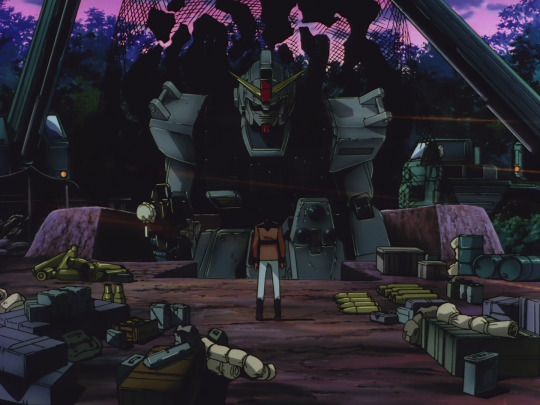
The number one thing I liked about The 08th MS Team: the characters have zero reverence for giant robots. And there shouldn't be! This is a story about soldiers almost a full year into a war where mobile suits and mobile armors have become the standard for combat. The Gundams are top-of-the-line equipment, but ultimately, still just equipment, so they don't earn much more that an initial wave of awe. The sole exception is Ginius, whose obsession with the Apsaras is his entire character; Aina and Norris's involvement with that project is largely out of loyalty to him, and to basically everyone else it's considered to be a frivolous waste of resources (which is saying something for Zeon, home of the Big Zam).
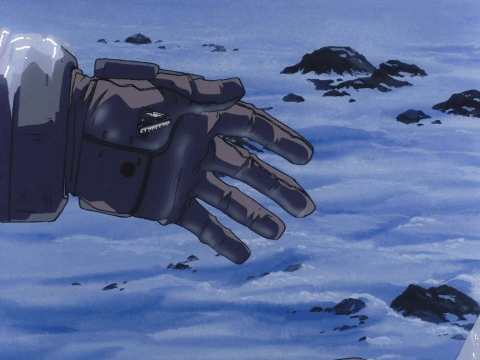
The number two thing I liked about The 08th MS Team: the staff had tons of reverence for the giant robots. There are so many little mechanical details to appreciate, but the one I want to call out special is when Shiro is coaching Aina on activating the beam saber to create a hot spring, and you see this intricate sequence revealing that there's a little connector in the hand that locks into another connector in the hilt. It's genuinely my favorite scene in this entire OVA.
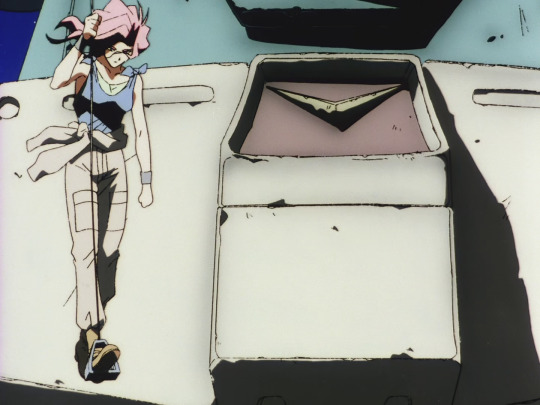
This ties into the detail-oriented nature of the production, but I do want to reiterate that this OVA looks fantastic the whole way through. To point to a specific example, Battle Line on the Burning Sand uses a super washed out color palette on everything to emphasize the blinding desert light, even at night.

The extent to which Shiro Amada is a White Meat Babyface Shonen Hero Boy is kind of refreshing. He's a remarkably simple, earnest guy with almost no clumsy awkwardness to his character.

He's also maybe the only character in Gundam thus far to have delivered an actually justifiable Bright Slap (other than the man himself) that didn't feel exclusively like 'MEMBER THE BRIGHT SLAP?????? Considering how much I hate when the Bright Slap is referenced for the sake of reference, I wanted to call attention to when corrections are actually used appropriately.
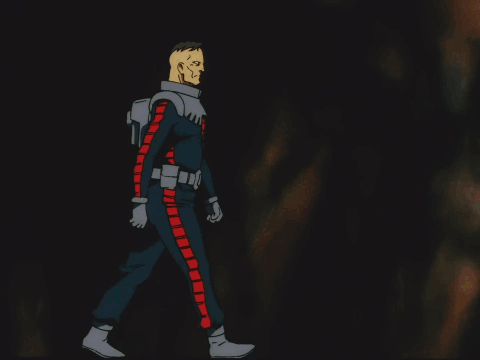
Norris Packard locks in Best Character, without question. Hard to argue against "Ramba Ral Mk-II with a bigger budget for when he pops off".
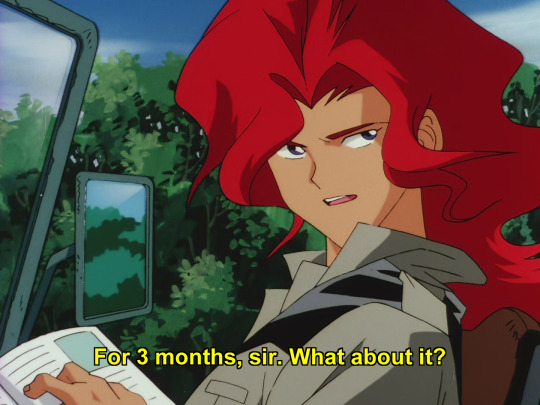
Wrote down WAOW BEAUTYFUL 90'S OVA WAMEN multiple times in my notes, but I do want to be slightly more specific and say that the character design for this series falls into my favorite style, which is very... "spiky". Being a 30-something, this style of character design hits the nostalgia center of my brain perfectly, despite the fact that I had never seen this particular series before. Like, if you compare Kou and Nina to Shiro and Aina, the difference in my mind would be described as "spikyness".
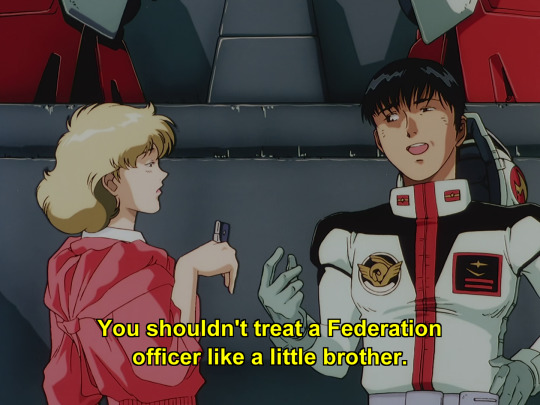
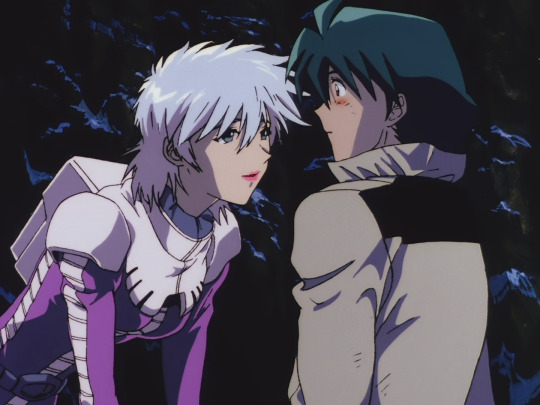
I'm actually gonna take an opportunity to punch 0083 and say I really appreciate that Shiro and Aina just a have a normal, adult relationship that doesn't introduce a last minute love triangle that feels as confused as it is tepid. Two good-looking young adults in extreme situations who are still drawn to one another despite being forced apart by circumstances is solid!
ELEDORE AND KAREN DON'T END UP TOGETHER ON SCREEN THANK GOD. I was really fuckin' scared for a bit there when Eledore kept going "MY WOMAN, KAREN, WHO I WILL MARRY" out of fuckin' nowhere. Hey, speaking of that...
THE STUFF I LIKED LESS:

Eledore sucks. He is a black hole of suck. Cowardly shitheels are nothing new- they're an institution, even, dating back to Kai in 0079- but in addition to being a cowardly shitheel who receives no comeuppance for being one, like Beecha in ZZ, he's also poorly written. And what sucks the most about that is the fact that he could've been totally acceptable with a grand total of like three expository lines peppered throughout the series. Even a single line about being drafted- something I don't think has ever been confirmed one way or the other in the Universal Century- would've gone a long way towards explaining why this guy was within 1000 miles of a warzone.

They shouldn't have had that last episode. It was fine, but I think the way The Shuddering Mountain (Part 2) ends is pretty much perfect. I genuinely wondered if it was tagged on years after the original, but it appears to have been planned from the start. Bizarre.
Okay, with those out of the way, I need to address what I feel is the underlying problem for this story: the writing in The 08th MS Team is hollow. I made a post taking a pot shot at the at the fact that this series is touted as being "grounded and realistic" when it does, in fact, have Newtypes, and tagged on the fact that it seems like the writer seemingly didn't understand that swans and swan imagery aren't a Newtype thing, they're a Lalah Sune thing. That wasn't something that actively bugged me in the moment, but the more I thought about the problems I had with this series on the whole, the more I thought about that. It's such a weird, superficial mistake to make... and then I latched onto the word "superficial", and it all came tumbling down from there.

Let's start with the theme. Like a lot of other Gundam stories, it can be boiled down to "War Is Bad", but what things lead to that understanding? We see countless reasons War Is Bad across all the preceding Universal Century TV shows, OVAs, and movies: the destruction of the environment, the devastation of the human population, the institutional disregard for human lives, including lives that are on your side, including the lives of children, the trauma- physical and mental- that haunts you even if you make it out alive, the arbitrary division of people who might otherwise be friends or lovers, how easily bad actors can consolidate power during or even with just the threat of war... all those are just off the top of my head, and I'm sure if pressed more can be listed. The 08th MS Team really only concerns itself with one of these- the arbitrary division of people who might otherwise be friends or lovers- because the main arc for both Shiro and Aina is that they abandon their respective duties because they are star-crossed lovers.
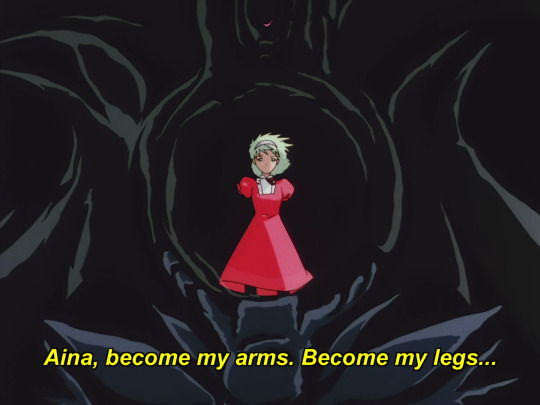
It's a weirder arc for Shiro than it is for Aina. Aina's association with Zeon comes across strictly as a birthright thing: the Sakhalins appear to be minor Zeon nobility, and her being a test pilot is all but stated to be at Ginius's request. So when she has two fateful life-or-death encounters with a quirked up white Japanese boy, she only really has to justify herself to her brother, which turns out to be pretty easy since he's gone off the deep end at that point anyway. The only thing that keeps her at the Zeon base past that point is her kindly nature, compelling her to help as many wounded people escape as she possibly can.

Shiro's break with the Federation, on the other hand, implies that he got so horny his higher brain functions shut down. And I get it! Aina's a Beautyful 90's OVA Wamen, but it's a little weird for him to completely renounce war so soon after we see his flashback where Zeon launched a gas attack inside a colony and he had to watch a man liquefy in front of his very eyes. You'd think that would matter more than just within the context of that one scene in that one episode!
(Also only realizing this as I write it, but like... was Zeon established to have used gas attacks before this OVA? 'Cuz gassing colonies was the Titans favorite move. Unlike the Newtype swans, it's fine for this to be introduced here, but in light of thinking about the Newtypes swans...)
Actually, Shiro's trauma being a non-factor is a great segue into weird out-of-character moments that start to crop up towards the end of the OVA. Not all the characters, and not all the time, but enough that I noticed several, including:
Aina swearing she's going to go sicko mode if Norris dies, only to not go sicko mode at all once Norris sends the signal that he's going to die.
Karen turning into Goku and getting excited about the prospect of fighting an enemy ace when Norris's Gouf Custom shows up, despite never having shown to be that kind of person before then, or afterwards.
Kellerne (the Zeon officer who cancels the Apsaras project) revealing he's actually a Noble Soldier in the episode where Ginius kills him, despite being a big brash shitheel not just in personal interactions, but also by breaking the Antarctic Treaty and using a nuke.
The 08th MS Team- the squad- never really felt like they developed any interpersonal relationships beyond being in a squad together (this is actually actually addressed in the short that was produced for the blu-ray), so the crux of the last episode being "IT'S CRITICALLY IMPORTANT TO ALL OF US THAT SOMEONE CONFIRMS THE COMMANDER IS STILL ALIVE!!!" is another contributing factor to why that episode just feels wrong.
These strike me as examples of "we need a character who will do x in this scene, but we don't have a character who would do x... well, for this scene, they will", and it colors the entire thing as utilitarian. It's not putting well-defined characters into situations, and then showing how those characters would react to that situation, it's presenting a conclusion and then working your way backwards to present the situation that leads to that conclusion.

And it's not even like this can be explained with the complaint (from people who don't engage with mecha anime) that mecha anime is more concerned with showing cool robots than it is with characters. This story is about the characters! The only particularly cool mecha stuff I have ever seen people point to in this is the Gouf Custom, which I now know is because that's really the only mecha stuff of note in this. Like, if you put a gun to my head to come up with other setpieces of note: the Apsaras blowing a hole clean through the mountain was striking imagery... the underwater fight with Kiki tumbling around the cockpit was fun... Shiro trying to take down the Zeon squad occupying the guerilla village on foot was probably the overall most compelling scene in the OVA.
Mind you, The 08th MS Team not having tons and tons of hyper memorable giant robot fight scenes is by no means a strike against it. I can probably only vaguely recall most action sequences from the Gundams I've watched to date, and that's because the cool giant robot fight scenes aren't really ever the point. But, with everything else being a bland and hollow as it is, the whole OVA just comes across as Things Happening. It's not even particularly interesting Things Happening; by nature of being a One Year War side story, you know nothing that happens here can really matter in the greater canon of the Universal Century, so in the end it really just feels like "All this stuff happened. Moving along!"
OTHER OBSERVATIONS:
At least some of my disappointment definitely comes from the fact that the OP writes a check that the OVA never really tries to cash. Based on this thing that plays before every episode and the way I've always heard people talk about it, I don't think it's unreasonable to have expected this to be a military drama!
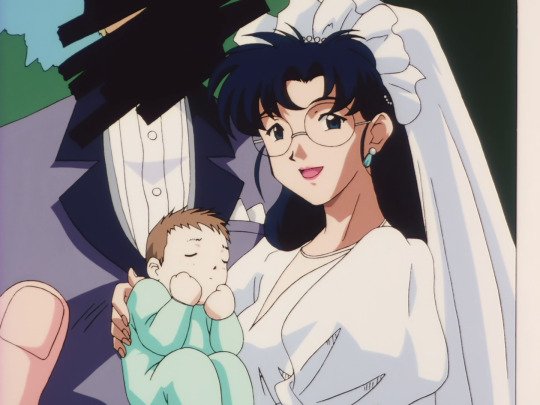
Oh nooo Michel you got Military Cucked Michel nooo, and judging by the picture (getting married after the baby is born) she must have gotten knocked up like right after she sent that Dear John letter Michel nooo!!!

It's a little weird that the last episode takes care to show that Shiro is lame following their escape, but no attention is called to the fact that Aina's normal suit got melted off. My understanding is that space suits are meant to be ultra heat resistant, so the fact that shit melted must mean she suffered horrible burns, right? Maybe it's working on fictional lava physics, where it's only hot if you're touching it, considering that neither the rest of her body nor Shiro suffer any burns from being that close to the beam.
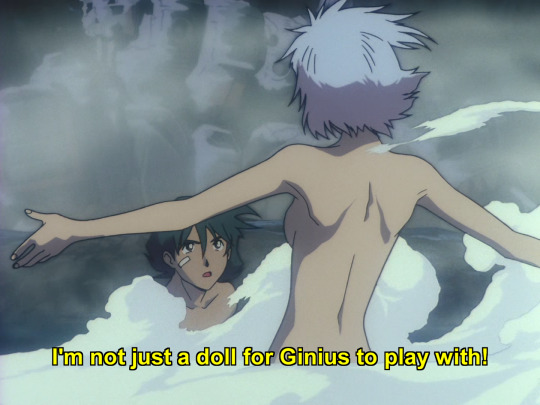
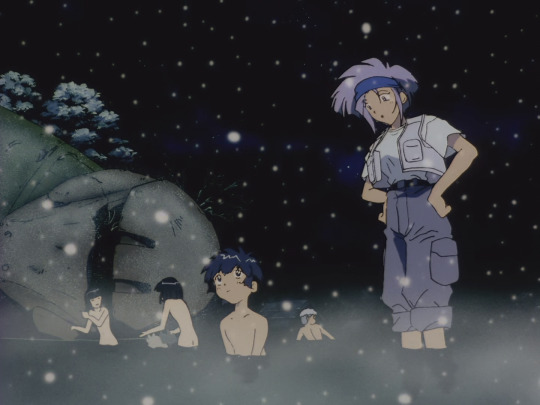
I understand that the implication is that Shiro and Aina taught the kids how to do it, but doing the "using a beam weapon to turn a frigid body of water into a hot spring" twice cheapened how cool it was the first time.
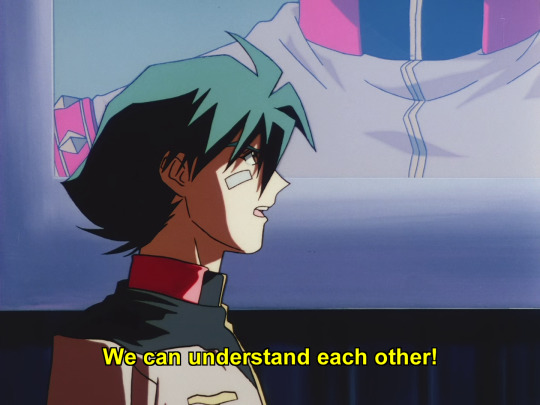
I was trying to hash out whether it would be worse to be subjected to a court martial or get grilled by your older brother slash superior officer for hooking up with an enemy combatant, but I never considered the dimension of the guards and brass just laughing their asses off at Shiro during the court martial, which makes that infinitely worse.

The blu-ray extra for this was a 9 minute short putting focus on Michel and Sanders, which was actually pretty nice considering how little they interact in the series proper. I'm a little bitter that this got a legit animated short while Cima Garahau got a "picture drama", but this was genuinely a much nicer way for the 08th MS Team to go out than Last Resort was.
IN CONCLUSION:
I re-read my post on the original Mobile Suit Gundam recently, and right at the start I talked about how I was originally only planning on checking out War in the Pocket, Stardust Memory, and this. It's actually kind of difficult to speculate how I would feel about Gundam as a franchise if I had watched those three OVAs in isolation. Maybe I'd like The 08th MS Team more if I didn't have have such a large base of things to compare it to unfavorably, or maybe I'd still wind up unenthusiastic about it, without having the ability to really express why. What I can say with certainty is that I've spent this entire write-up thinking about how the two minute send-off for Duker Iq and Renda- two minor recurring antagonists- in Victory Gundam was significantly more affecting and engaging than anything in The 08th MS Team.
If you'll indulge a food analogy, the experience of watching this really was like eating a sleeve of crackers. They're crackers: there's nothing wrong with them, but rarely if ever will you walk away from eating a sleeve of crackers going "damn, that was great!"
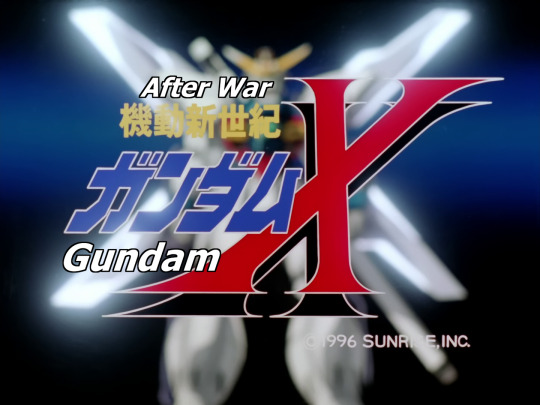
Next up: After War Gundam X! I'm super pumped for this one, because I know almost nothing about it besides the fact that it was the only Gundam TV Series to have been cancelled after 0079. Was it cancelled because of franchise fatigue? Or because it was bad? Possibly some third thing? All or none of the above? I'm excited to find out!
Also it's the source of that funny doctor with a gun meme! You know the one!
16 notes
·
View notes
Text
Sometimes it's alienating to be a trans girl who's not Insane about the mecha genre for the most part.
Like I've watched a nontrivial amount of Gundam (though in a rather scattershot manner that includes the original series' compilation films, like two episodes of Zeta, the War in the Pocket OVA, F91, maybe one episode of Unicorn, and all of Witch From Mercury), but most of it just hasn't stuck with me.
Meanwhile the FOMO and anxiety from not resonating with Heaven Will Be Mine was so bad that I outright had to have it as a trigger warning in one of my group chats for a while; I gave it a shot again a few years back and while I neither finished nor Got It, I at least got past the worst of the mental hangup with it.
I suppose I enjoyed Pacific Rim and Neon Genesis Evangelion well enough, and I've played tabletop RPGs like Beam Saber, Lancer, Armour Astir: Advent, and Girl by Moonlight's NGE-esque mecha playset, but none of it has reached the kind of critical mass that it does for some other people in my circles.
And I just get basically nothing out of the bodies and identity thematics of it, and I might just have an allergic reaction to the "hot and sexy and horny and messy mech pilot" archetype.
Also the Armored Core 6 hype has likewise basically passed me by.
Iunno, it's not like the end of the world, and I am sitting on some mecha campaign concepts of my own, but I can't shake off the feeling of doing it all Wrong in one way or another, and sometimes it's just frustrating to have to deal with.
5 notes
·
View notes